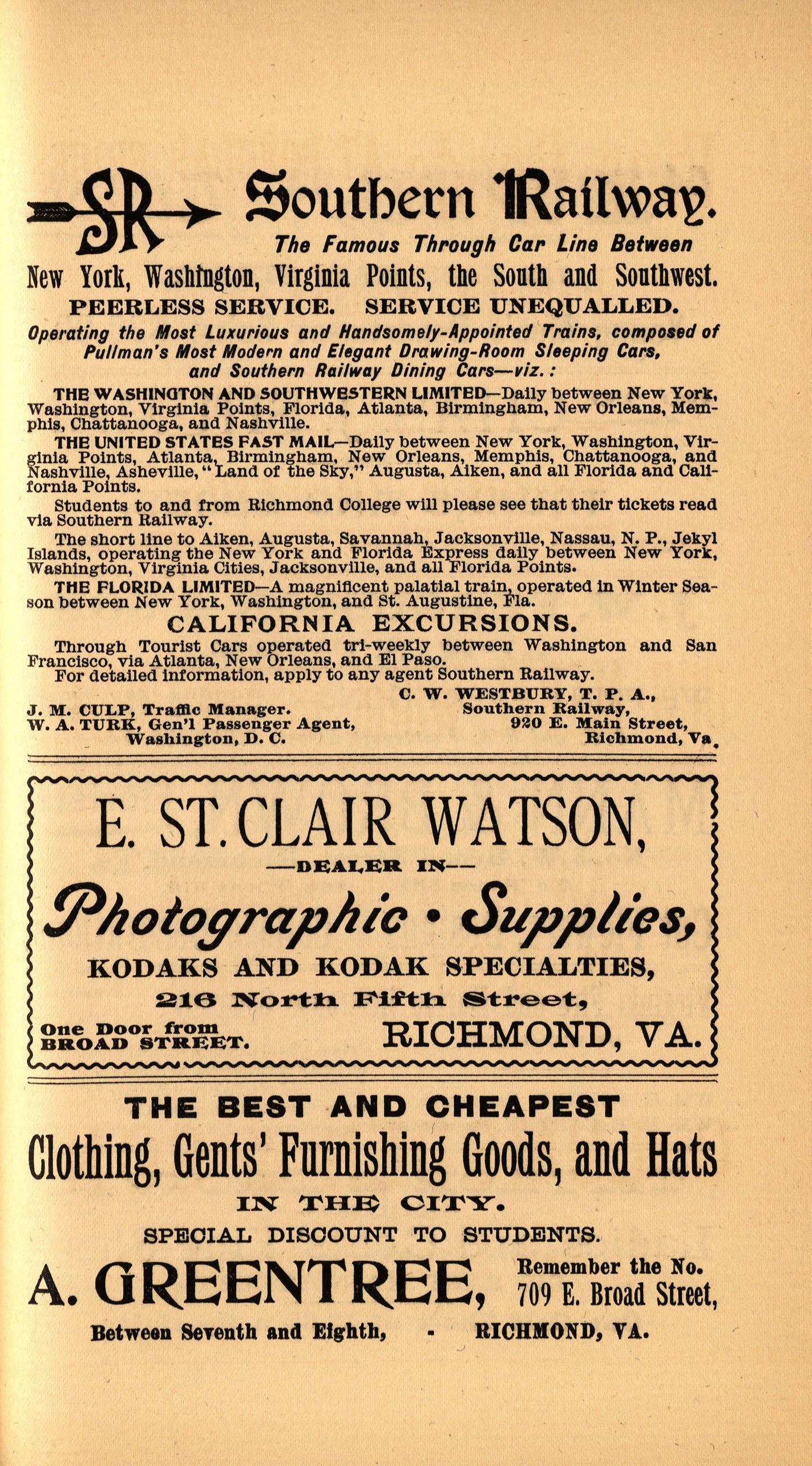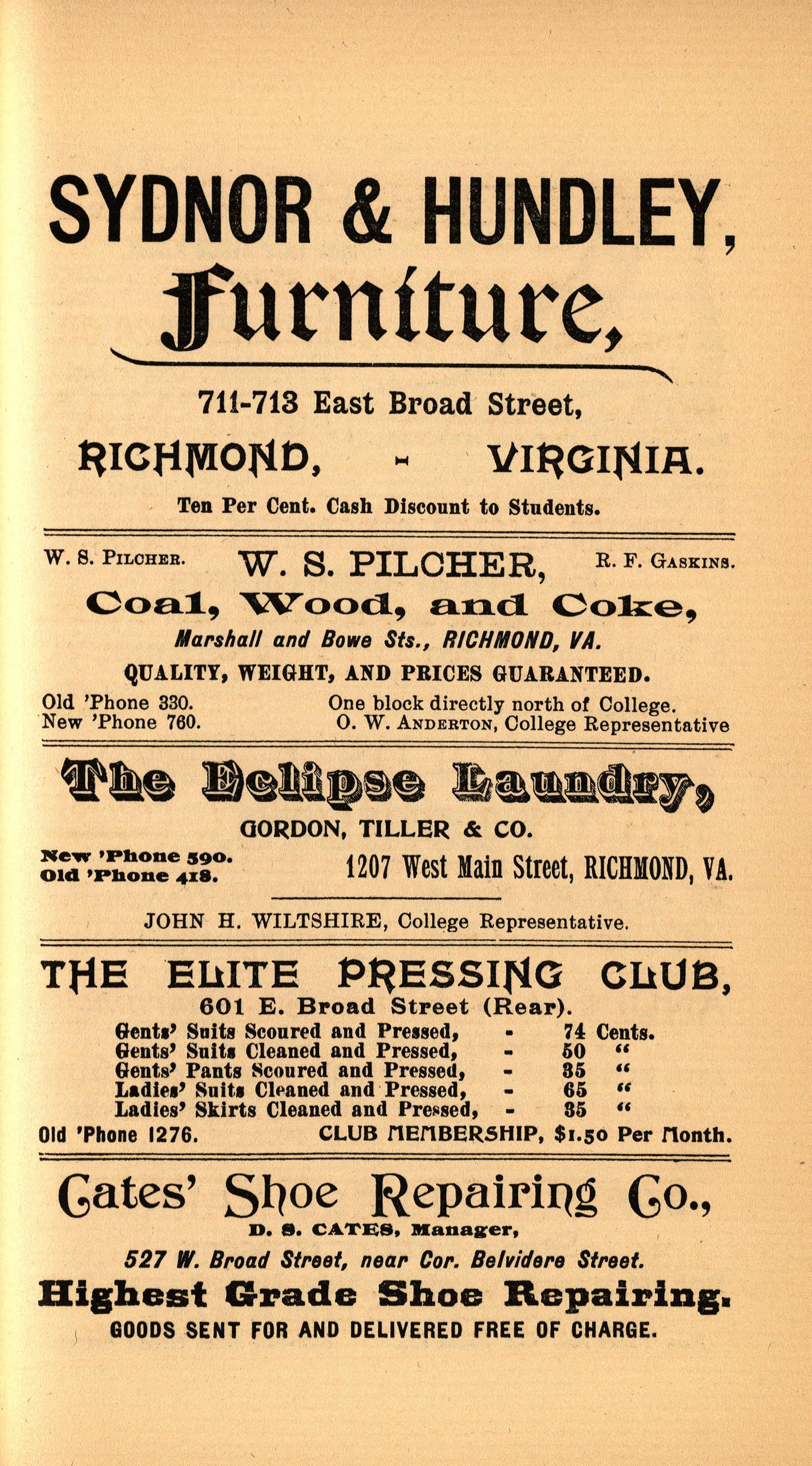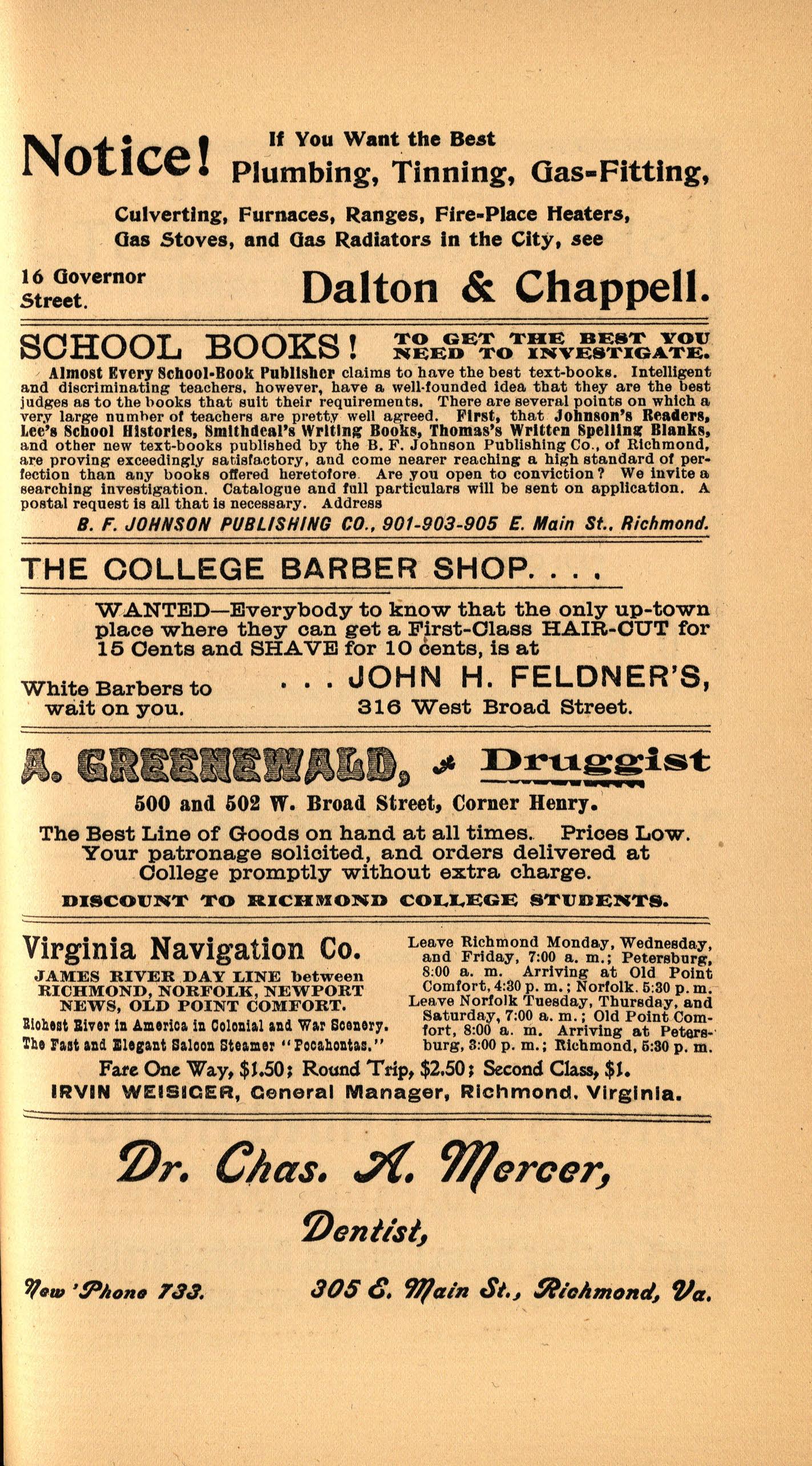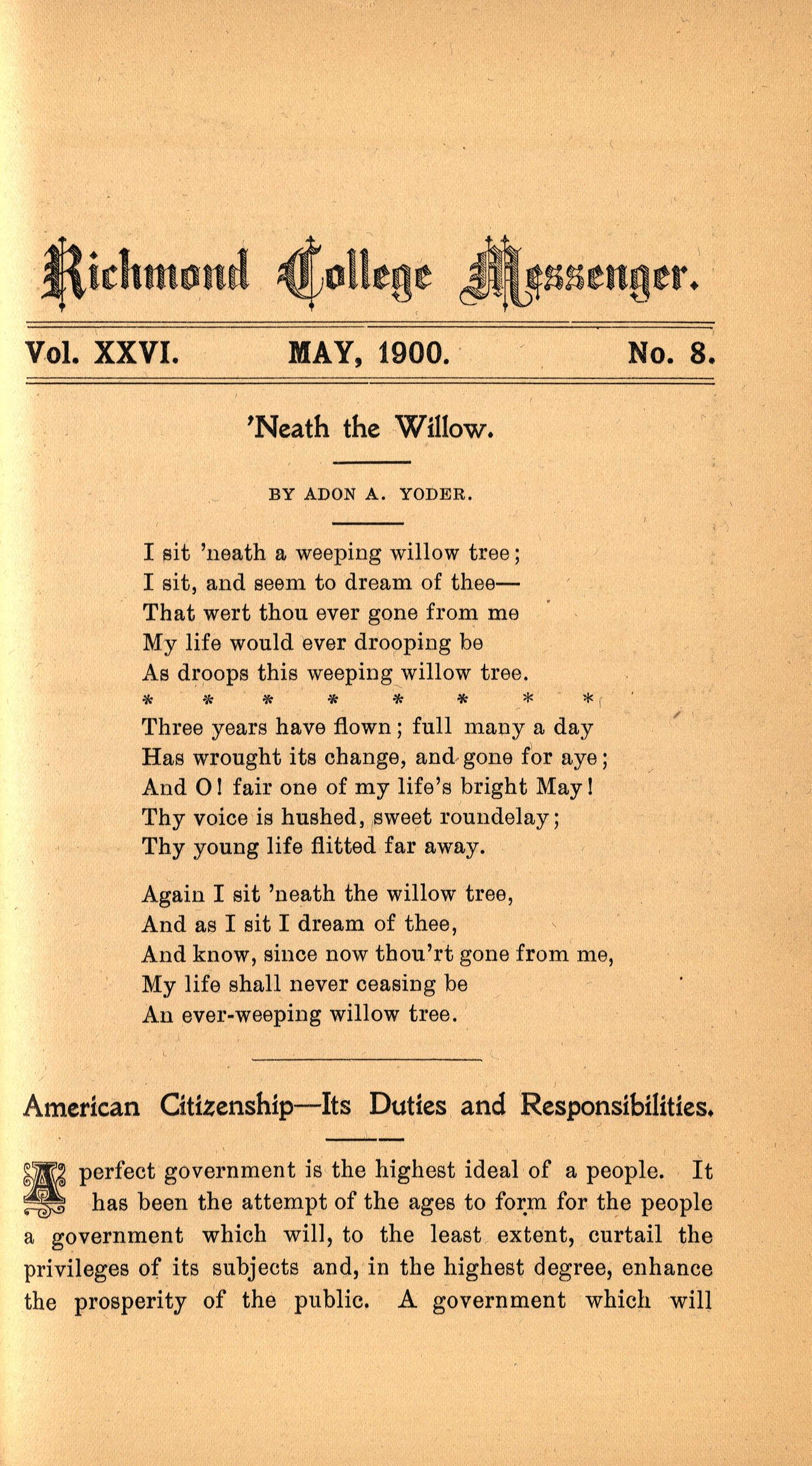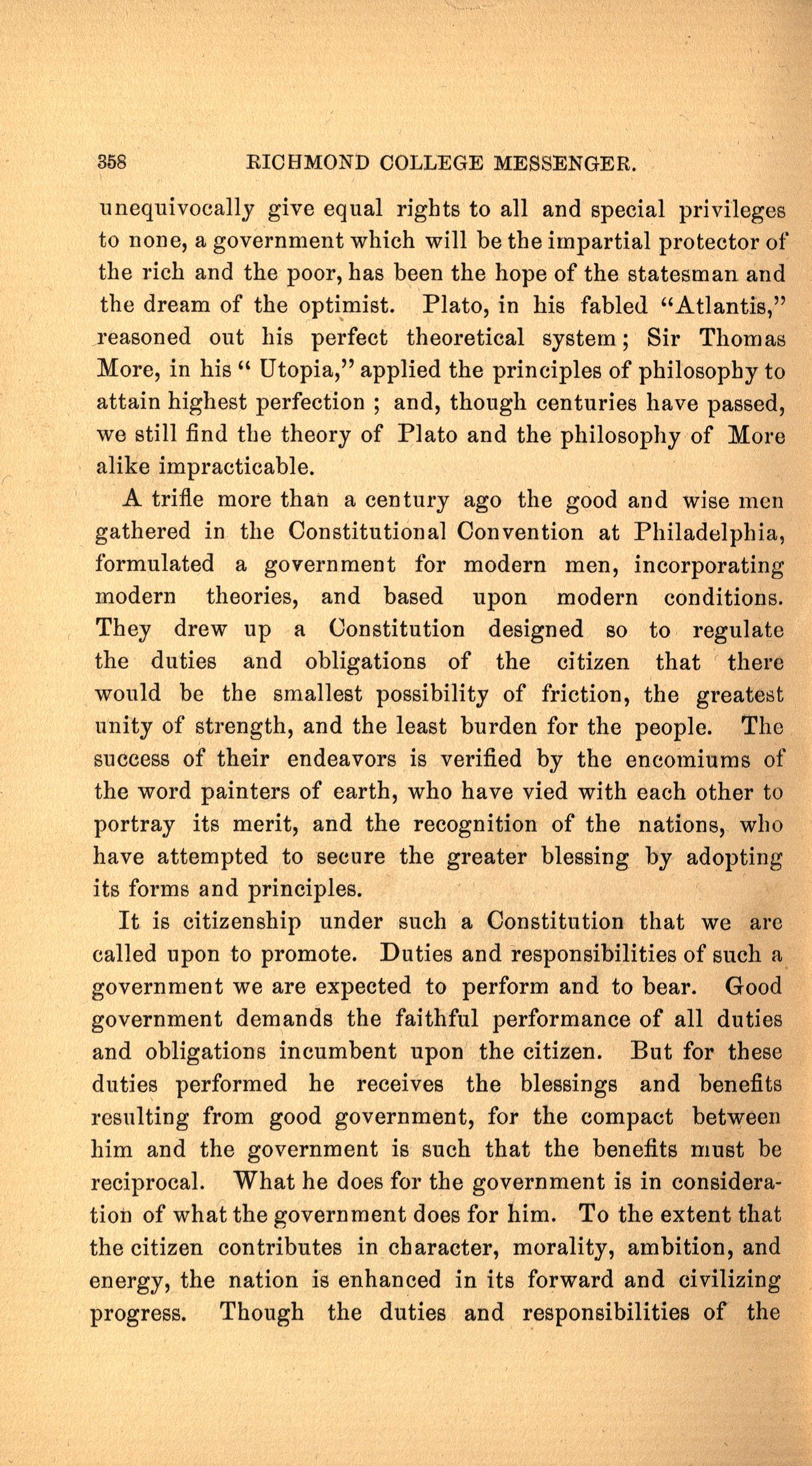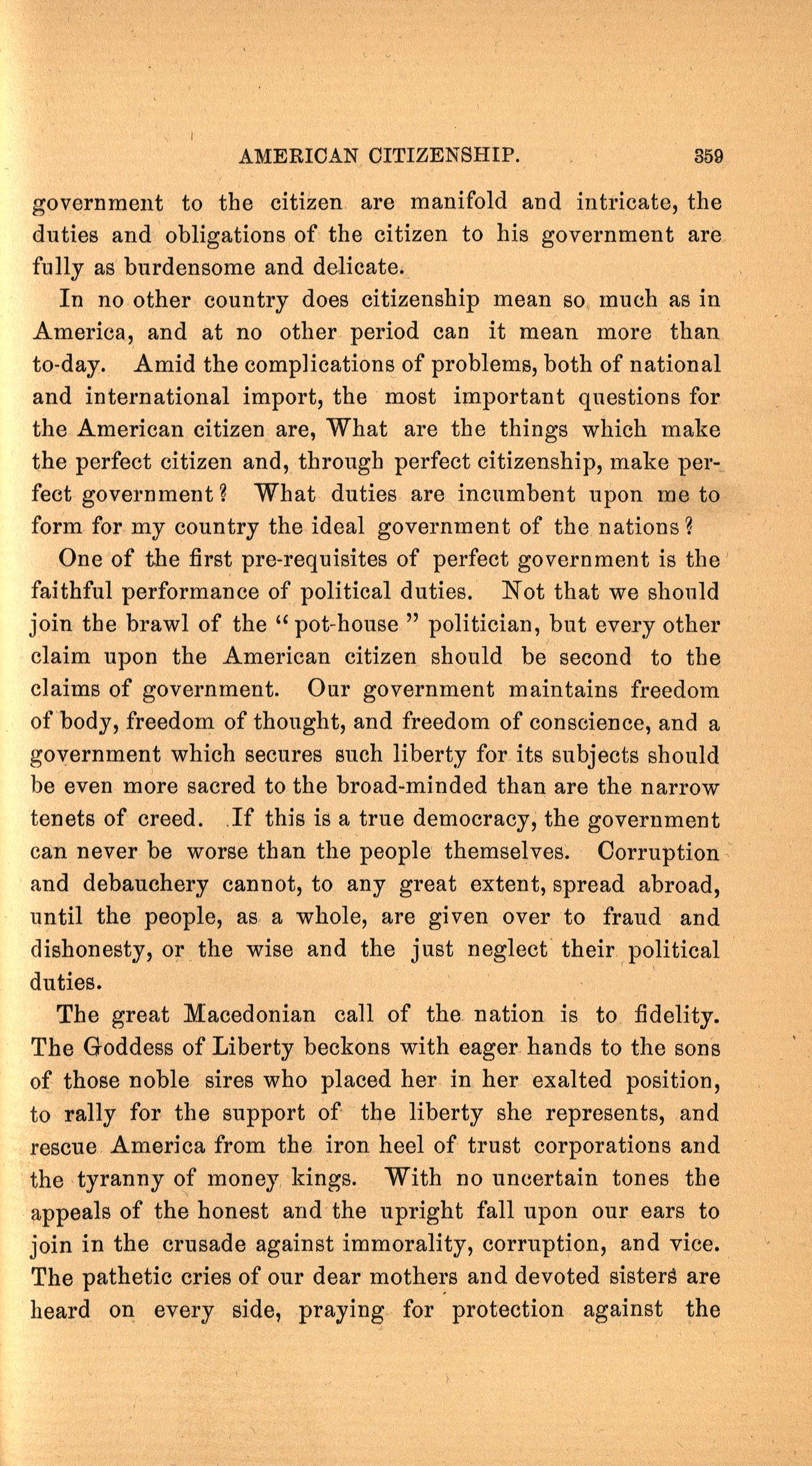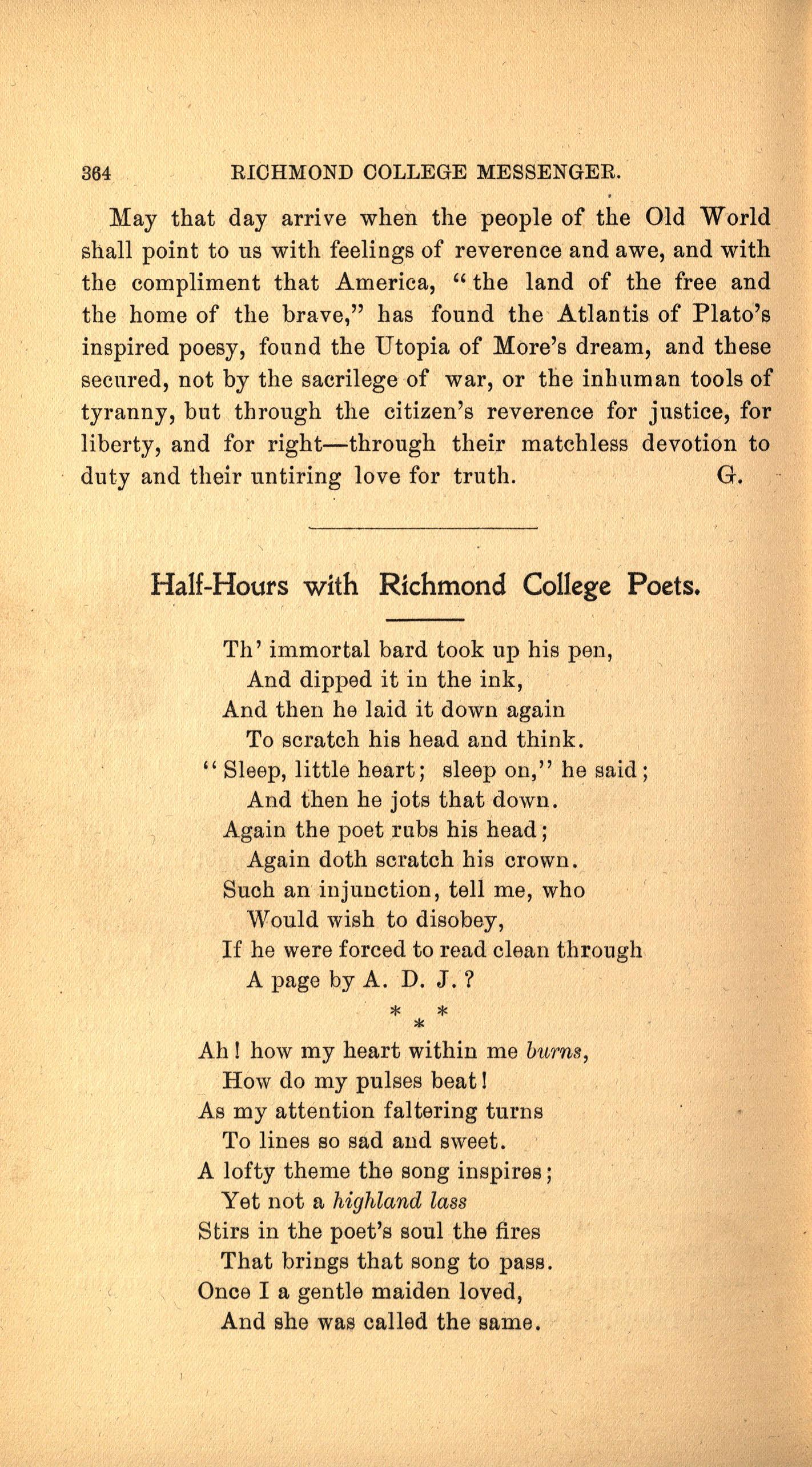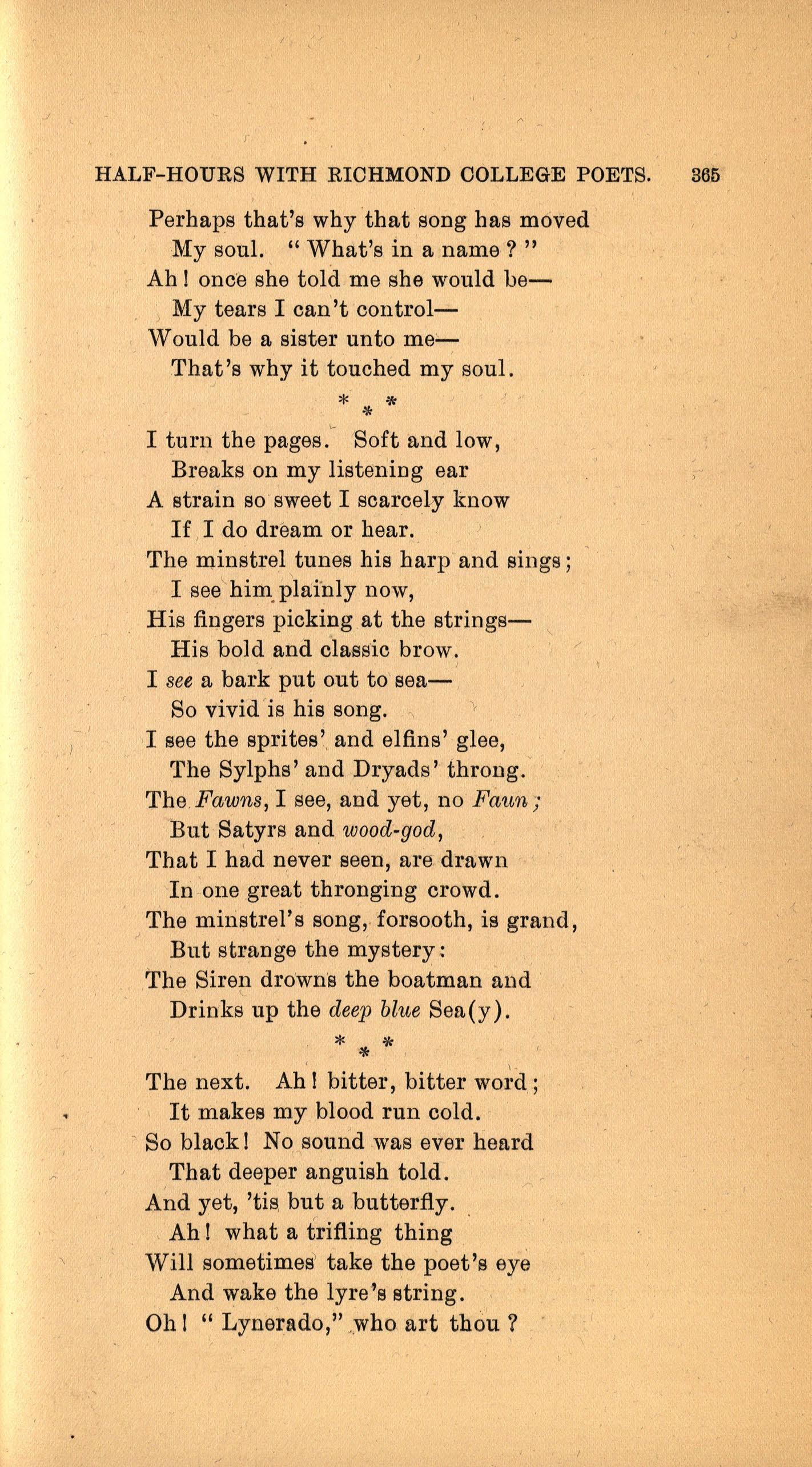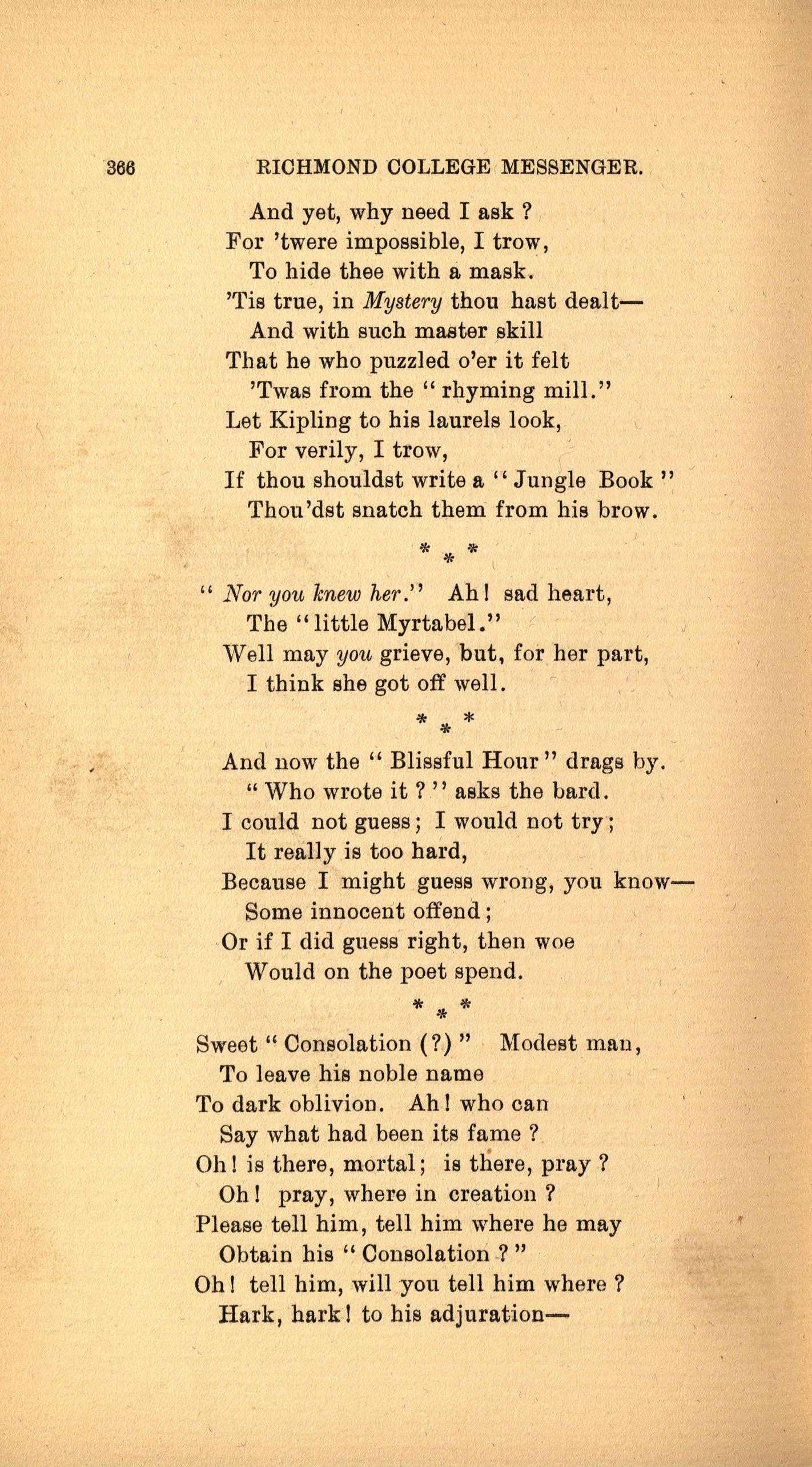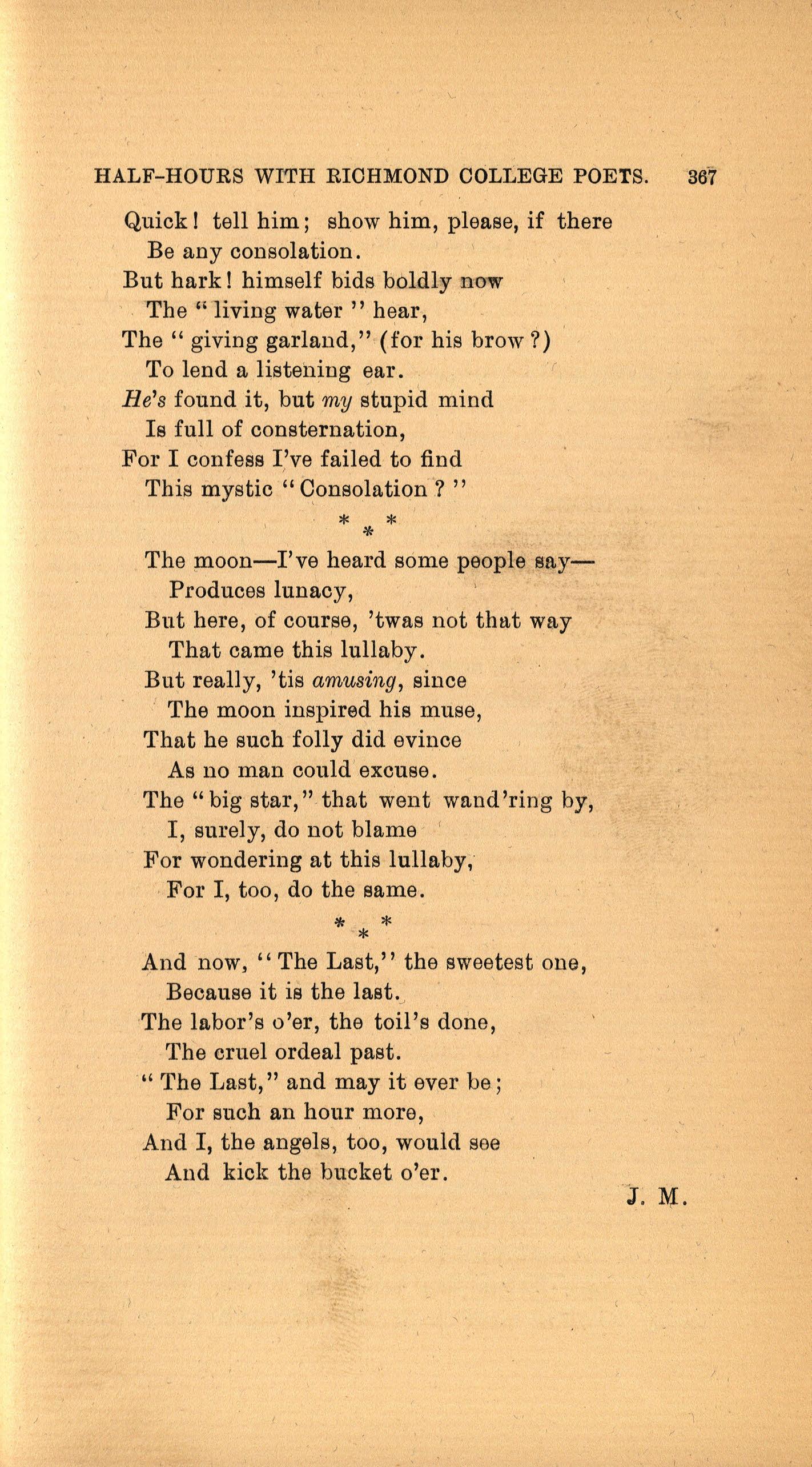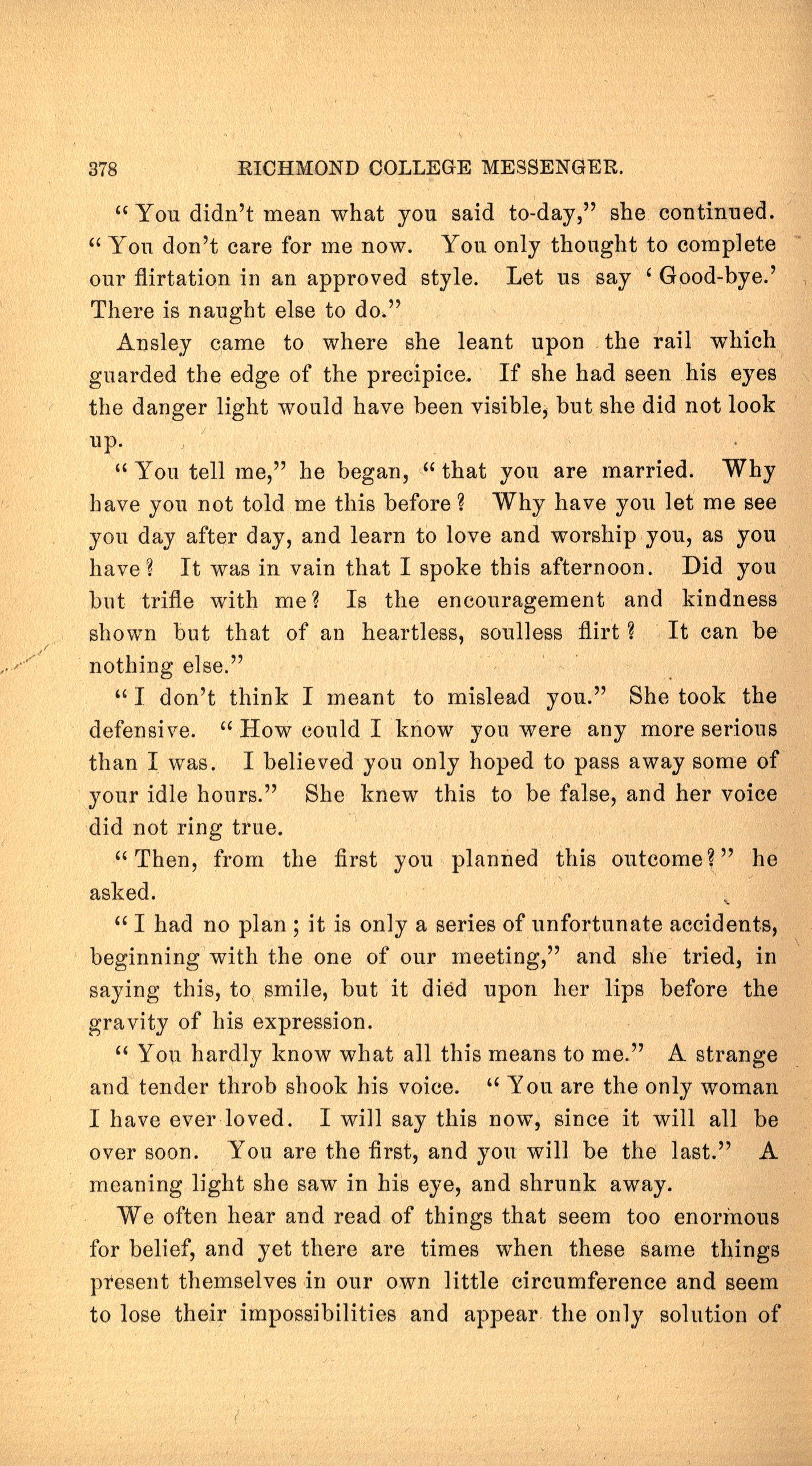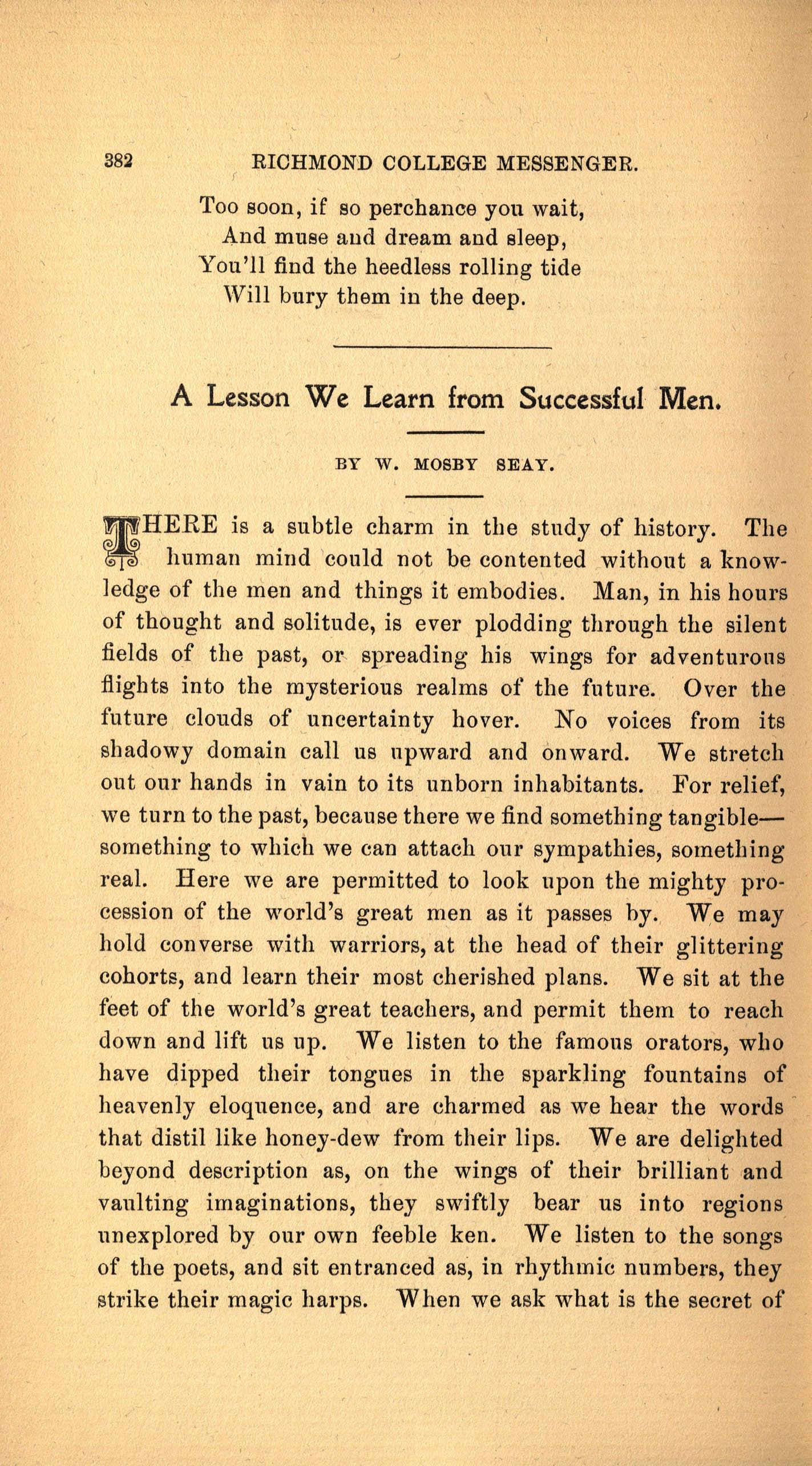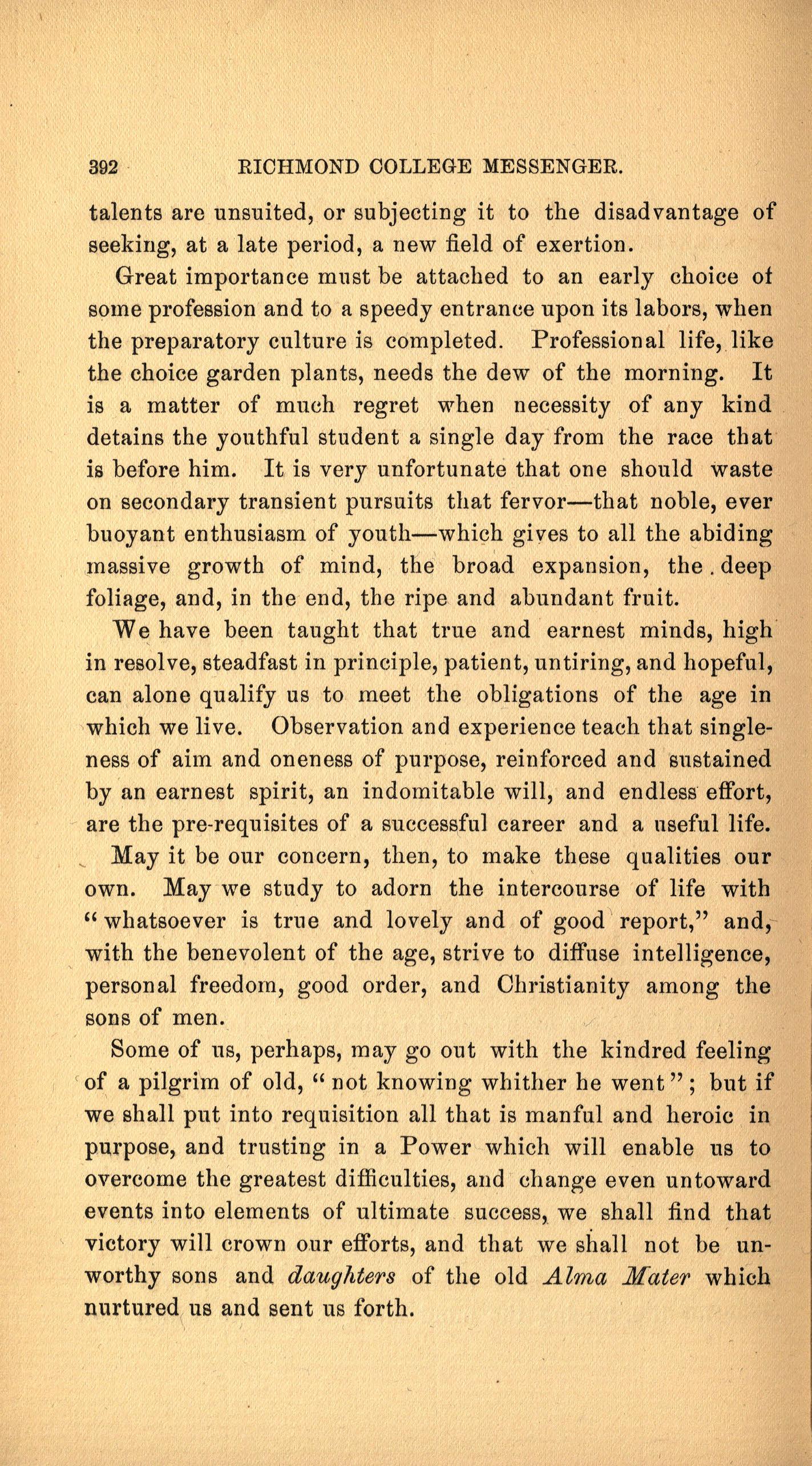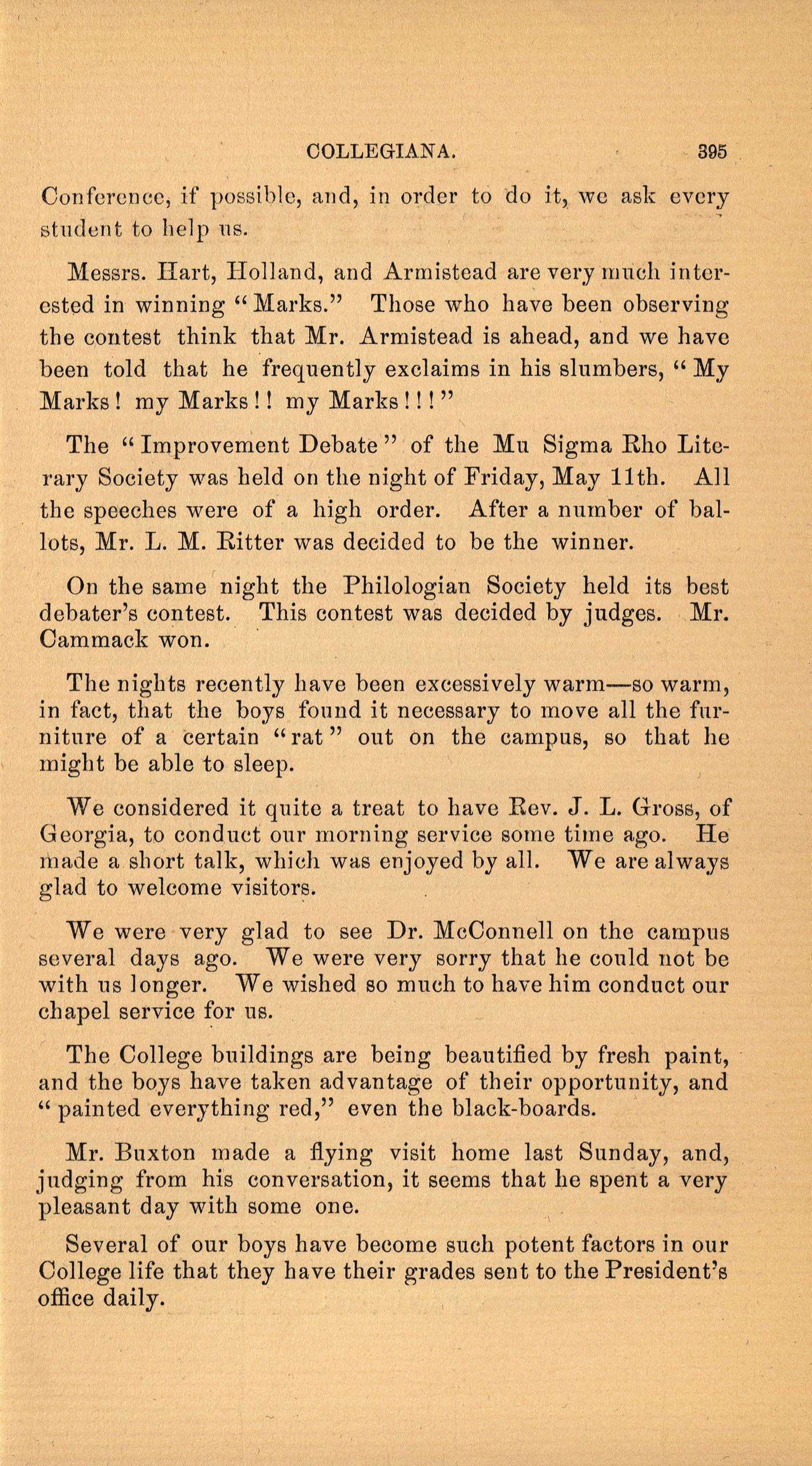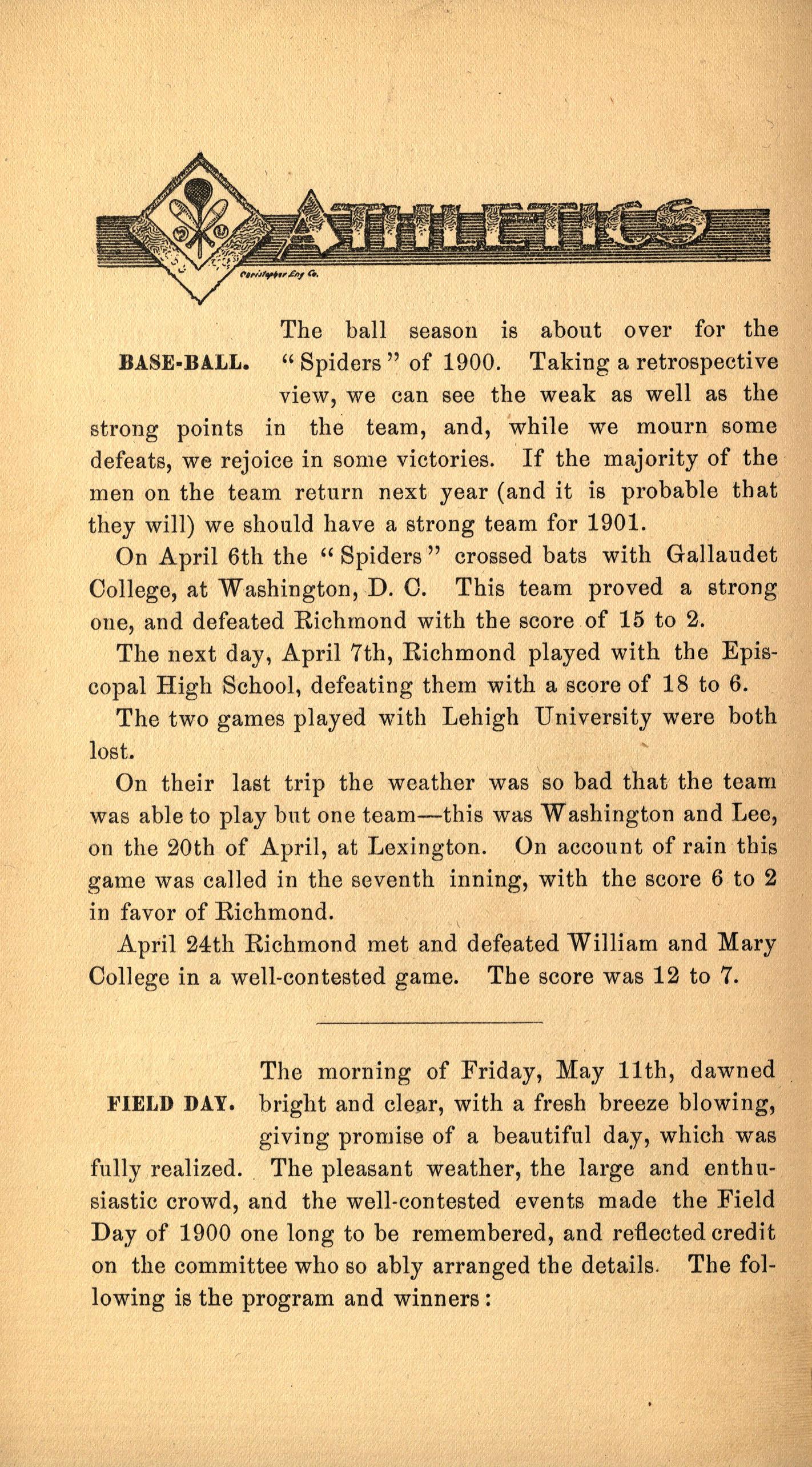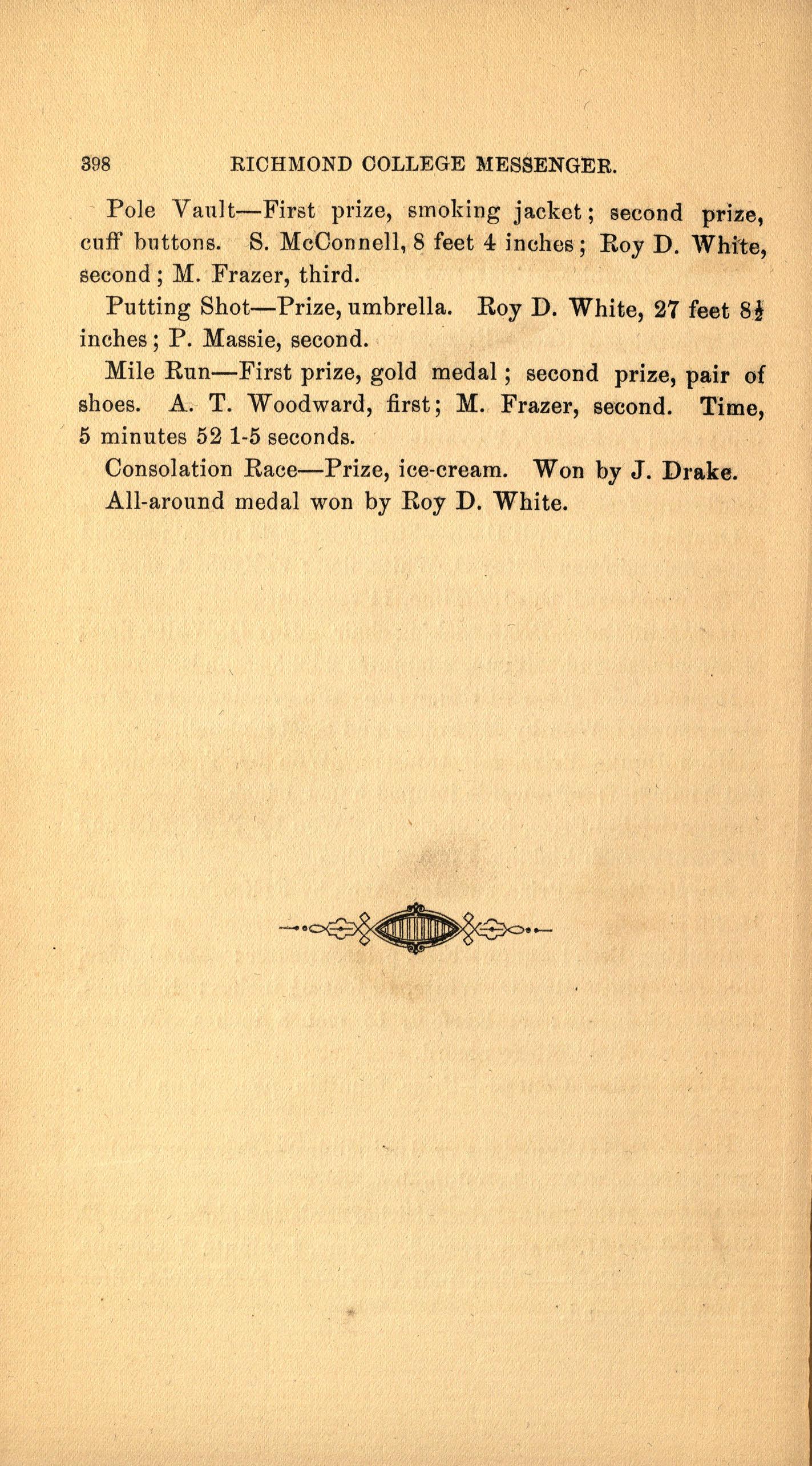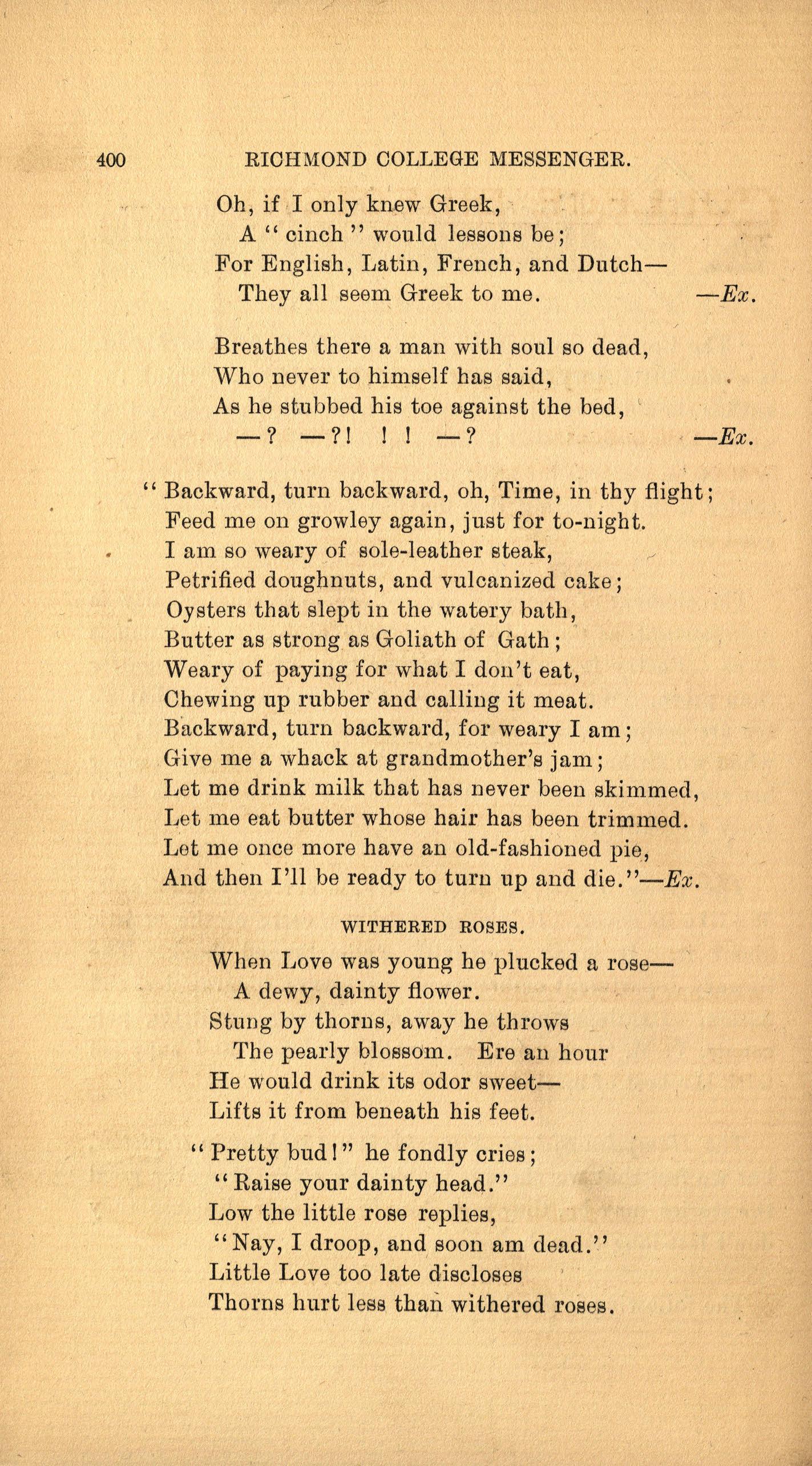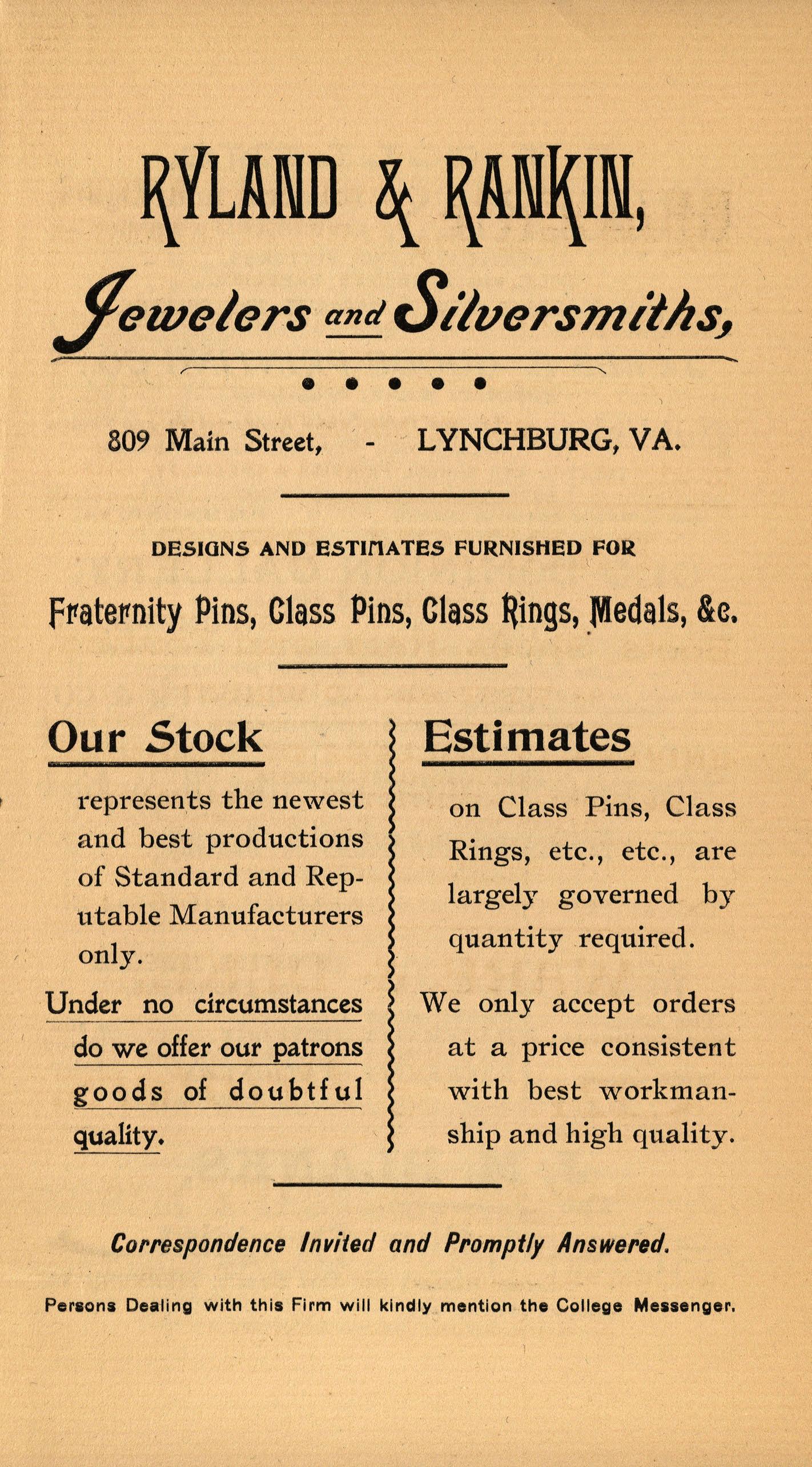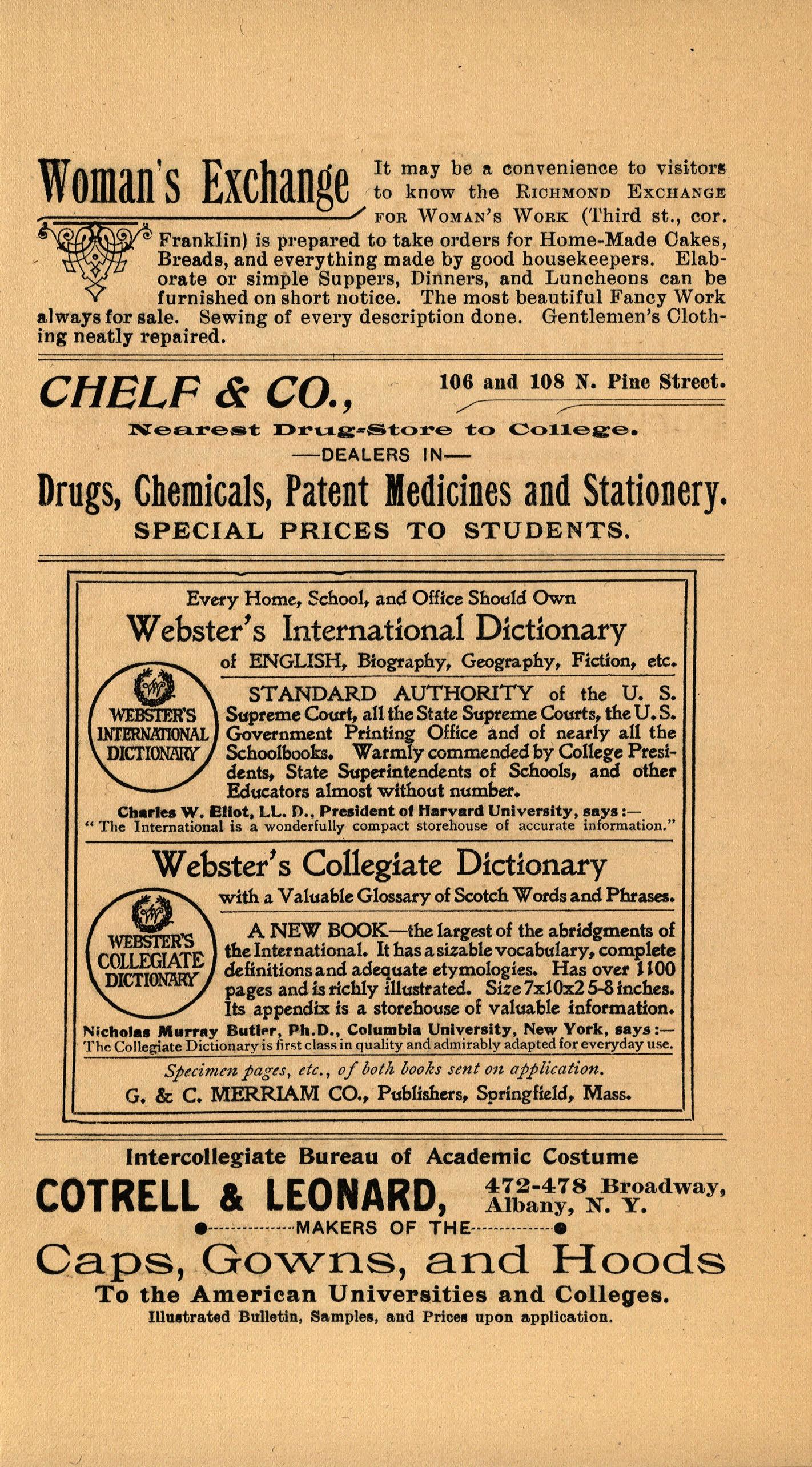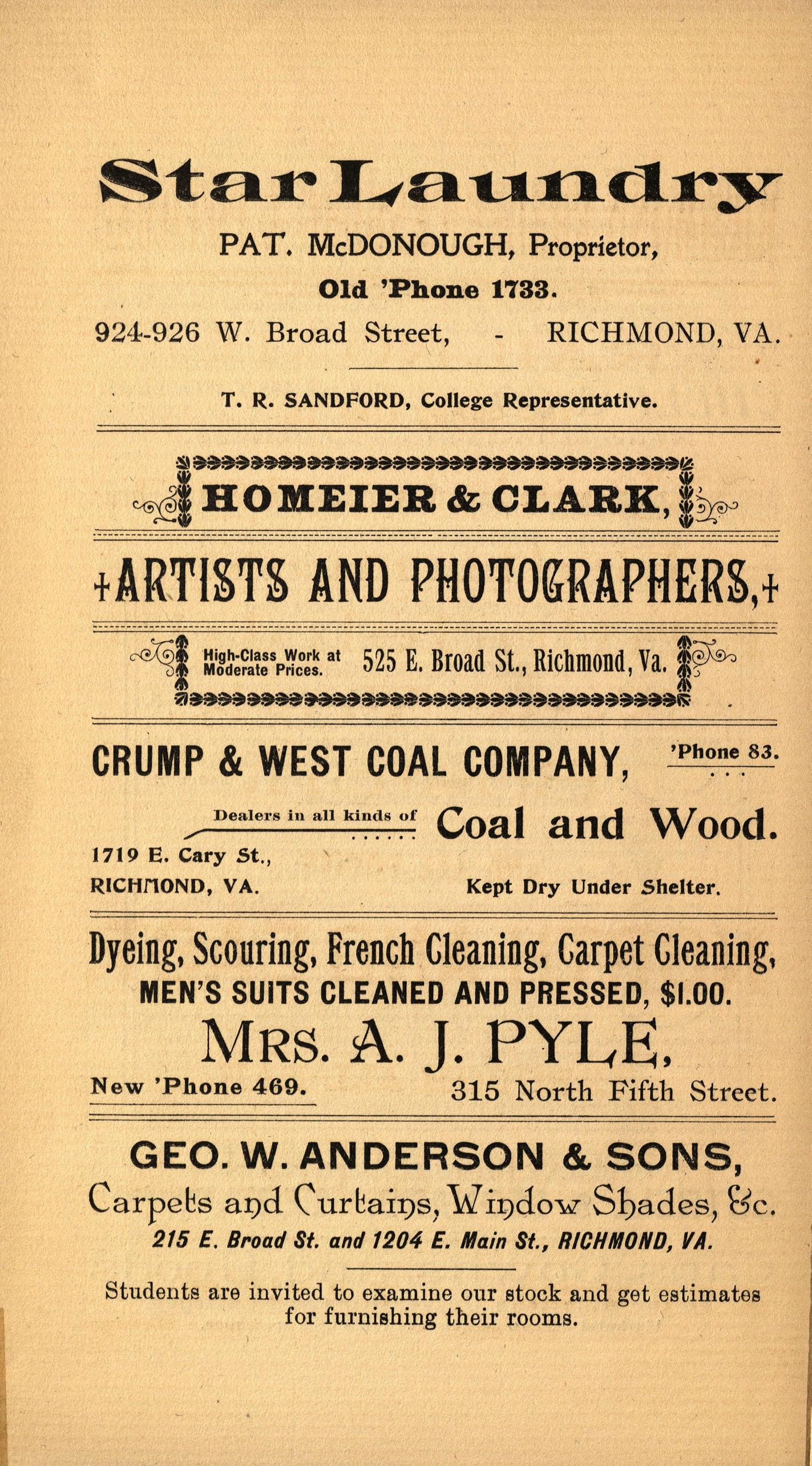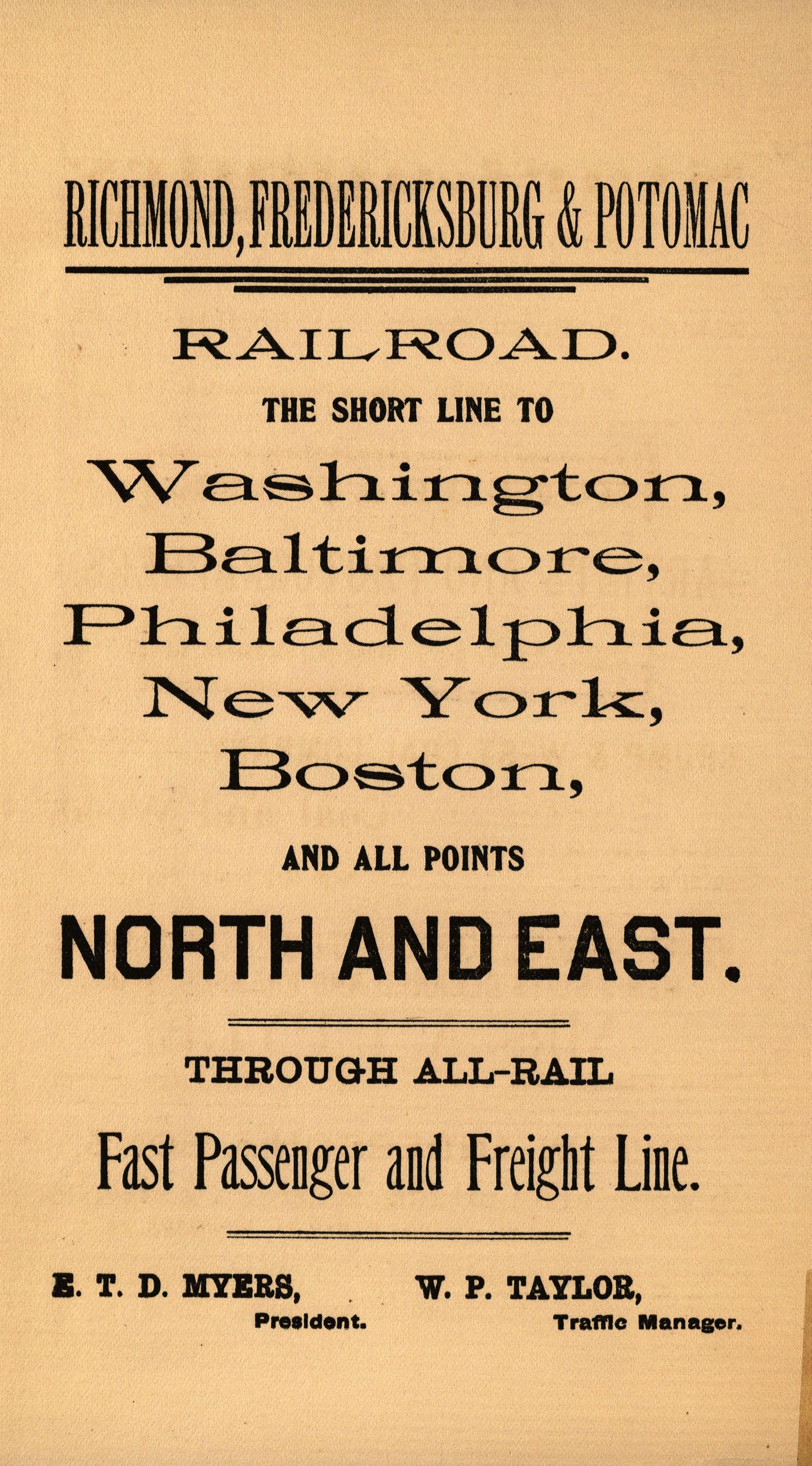The Famous Through Car Line Between NewYork,Washtngton,VirginiaPoints,the SouthandSouthwest. PEERLESS SERVICE. SERVICE UNEQUALLED.
Operating the Most Luxurious and Handsomely-Appointed Trains, compo,ed of Pullman's Most Modern and Elegant Drawing-Room Sleeping Cars, and Southern Railway Dining Cars-viz. :
THB WASHINOTONAND SOUTHWESTERN LIMITED-Dall y between New York, Wa sh ington , Virginia Points, Florida, Atlanta, Birmingham, New Orleans, Memp his, Chattanooga, and Nashville.
THB UNITED STATES PAST MAIL-Dally between New York, Washington, Virginia Point s , Atlanta'r..Blrmingham , New Orleans, Memphis, Chattanooga, and R a shville, Asheville," and of the Sky," Augusta, Aiken, and all Florida and Calif ornia Points.
Students to and trom Richmond College wm please see that their tickets read via Southern Railway .
The short line to Aiken, Augusta, Savannah, Jacksonville, Nassau, N. P , Jekyl Is land s, operating tbe New York and Florida Express daily b etween New York, Wa shington, Virginia Cities, Jacksonv1lle, and all Florida Points,
THE FLORIDA LIMITED- A ma g nitlcent p a latial train..,_operated in Winter Season betw e en New York, Washington, and St Augu stin e , .1"1a.
CALIFORNIA EXCURSIONS.
Throu g h Tourist Cars operated tri -weekly betwe en Wa s hington and San Fr a n ci sco, via Atlanta, New Orleans, and El Pa s o. F or detailed information, apply to an y a g ent South ern Railway.
J .M. CULP, Traffic Mana ge r. w A. TURK, G e n'l Pas s enger Agent , Washington, D, C.
THE COLLEGE BARBER SHOP
in the PROFESSOR! ~d r~E~~f ST
Richmond College. We feel it our duty, as LEADERS IN OUTFITTING, to supply them with the most serviceable and best in wearing apparel , at LOWER PRICES than obtainable elsewhere . We've suited this fe eling to the action, and offer you your Fa.11 a:nd 'Wi:nter Ou.t::i:it, from bead to foot, at lower figures than were ever quoted you, and allow you TEN PER C~NT. DISCOUNT off those prices. We shall expect you all in. . . . . . . .
Vol. XXVI. MAY, 1900. ·
'Neath the Willow.
BY ADON A. YODER.
I sit 'neath a weeping willow tree; I sit, and seem to dream of theeThat wert thou ever gone fro~ me My life would ever drooping be As droops this weeping willow tre e . * * * * * * * * r
Three years have flown; full many a day Has wrought its change, and , gone for aye; And O ! fair one of my life's bright May! Thy voice is hushed, sweet roundelay; Thy young life flitted far away.
Again I sit 'neath the willow tree, And as I sit I dream of thee, And know, since now thou'rt gone from me, My life shall never ceasing be An ever-weeping willow tree.
American Citizenship-Its Duties and Responsibilities.
perfect government is the highest ideal of a people. It has been the attempt of the ages to foi;m for t~e people a government which will, to the least extent, curtail the privileges of its subjects and, in the highest degree, enhance the prosperity of the public. A government which will
358 RICHMOND COLLEGE MESSENGER.
unequivocally give equal rights to all and special privileges to none, a gove.rnment which will be the impartial protector of the rich and the poor, has been the hope of the statesman and the dream of the opti ,mist. Plato, in his fabled "Atlantis," reasoned out bis perfect theoretical system; Sir Thomas More, in his" Utopia," applied the principles of philosophy to attain highest perfection ; and, though centuries have passed, we still find the theory of Plato and the philosophy of More alike impracticable.
A trifle more than a century ago the good and wise men gathered in the Constitutional Convention at Philadelphia, formulated a government for modern men, incorporating modern theories, and based upon modern conditions. They drew up a Oonstitution designed so to regulate the duties and obligations of the citizen that there would be the smallest possibility of friction, the greatet1t unity of strength, and the least burden for the people. The success of their endeavors is verified by the encoiniums of the word painters of earth, who have vied with each other to portray its merit, and the recognition of the nations, who have attempted to secure the greater blessing by adopting its forms and principles.
It is citizenship under such a Constitution that we are called upon to promote. Duties and responsibilities of such a government we are expected to perform and to bear. Good government demands the faithful performance of all duties and obligations incumbent upon the citizen. But for these duties performed he receives the blessings and benefits resulting from good government, for the compact between him and the government is such that the benefits must be reciprocal. What he does for the government is in consideration of what the government does for him. To the extent that the citizen contributes in character, morality, ambition, and energy, the nation is enhanced in its forward and civilizing progress. Though the duties and responsibilities of the
government to the citizen are manifold and intricate, the duties and obligations of the citizen to his government are fully as burdensome and delicate.
In no other country does citizenship mean so much as in America, and at no other period can it mean more than to-day. Amid the complications of problems, both of national and international import, the most important questions for the American citizen are, What are the things which make the perfect citizen and, through perfect citizenship, make perfect government i What duties are incumbent upon me to form for my country the ideal government of the nations~
One of the first pre-requisites of perfect government is the faithful performance of political duties. Not that we should join the brawl of the "pot-house" politician, but every other claim upon the American citizen should be second to the claims of government. Our government maintains freedom of body, freedom of thought, and freedom of conscience, and a g overnment which secures such liberty for its subjects should be even more sacred to the broad-minded than are the narrow tenets of creed. .If this is a true democracy, the government can never be worse than the people themselves. Corruption · and debauchery cannot, to any great extent, spread abroad, until the people, as, a whole, are given over to fraud and dishonesty, or the wise and the just neglect their , political '
The great Macedonian call of the nation is to fidelity. The Goddess of Liberty beckons with eager hands to the sons of those noble sires who placed her in her exalted position, to rally for the support of tl)e liberty she represents, and rescue America from the iron heel of trust corporations and the tyranny of money , kings. With no uncertain tones the appeals of the honest and the upright fall upon our ears to join in the crusade against immorality, corruption, and vice. The pathetic cries of our dear mothe1:s and devoted sister~ are heard on every side, praying for protection against the
RICHMOND COLLEGE MESSENGER.
v1c10us a s~aults 1 of the lawless negro. Tpe mighty issues before our legislative and executive bodies call us with unceasing voice to shoulder the duties of political government. And yet there are those in our body politic, claiming to be the better citizen, who refrain from participation in political conflicts, "because," they -say, "politics have become corrupt."
Shall men shrink from the tasks of government because of the magnitude of the work, or neglect their duty because of flagrant wrongs f Shall men . shrug their shoulders with chilling scepticism at the efforts made by the honest citizen to purify and redeem our body politic, and hurl their shafts of scorn at those brave spirits who, "choosing danger and disdaining sh,ame," have thrown themselves into 'the midst of evil and fight it unto death?
May God forbid ! Let those who are sunk to such , pessimism and despair remember that to each citizen belon .gs a share of the responsibility for the cond}tions they deplore, and it is unworthy of a man to put into complaint the energy that might go into efl'.ort. There is not an error nor a deformity in our political administration to-day that cannot and that will not be corr~cted when all honest and patriotic citizens join in a peaceful expression of their sober convictions, in the way designed by the great American basic law-the _ Constitution.
The ballot-boi is the safety-valve for the escape of the high pressure of corrupt political practices. In order that we make this a medium of greatest power, we must acquaint ourselves with the principles of political science. And t~is leads me to say that one of the first duties 1 of the American citizen i s to educate. " Educate for citizenship " has become the watch -word of the most progressive nations on the globe. Educate not only in a scientific and literary course, but in the broad principles of governmental policy, in politics-the science of government. A representative democracy 'demands

not only freedom, but also intelligence. The rulers and lawmakers of such a government are supposed to be leaders of men-the public servants elected by intelligent voters to do their will. When the people are deficient in the knowledge of political issues, and are not capable of reasoning from cause to effect, then will the selection of thelr representatives be subject to the influence of the demagogue and the scheming politician. The sublimest duty of the American people is to deyelop the highest standard of citizenship, by educating the citizen in tho se principles which form the true and the ideal government. The day , must come in our history when, if we would maintain our system of government by the people, political philosophy must find an important place in the student' s curriculum. Then shall the tidal wave of intelligence, sweeping along our coasts and up into the rivers and rivulets of 'our national life, carry before its rush the ,citadels and forts of corrupt politics and unjust legislation, and bear upon it s bosom the bark of justice, prosperity, and ' peace. Then shall the Old World governments, organized upon the principles of classes and castes, look for guidance to a people all of whom are educated and any citizen of , which is capable of assuming a position as exalted as a king.
We are also called upon, as citizens and as men, by the highest motives of duty, of interest, and of happiness, to obey the l a ws of our land. Unless this ' duty is faithfully performed no government can survive. Inevitable doom awaits the people who disrespect authority and set at naught the will of the law-making powers. And that country is destined to ruin whose citizens ignore the laws and violate the principle s imbedded in its constitution. No representative government should make laws which the will of the people says should not be enforced; but, when laws are made, they should be enforced until their impropriety or their impracticability should force their repeal : It is also' the duty of every citizen, not only to obey the law.s of the gqvernment himself, but to aid faithfully
362 RICHMOND COLLEGE MESSENGER.
in the coercion of those who disrespect authority and, by their actions, attempt to violate this fundamental principle of good government. It is truly incumbent upon every American citizen not only to be honest with his government, but al so to see that all others are honest therewith.
Furthermore, i.t is every citizen's duty to be patriotic. This wa s one of the most solemn obligations and duties of the citizen of the ancient nations, and it is no less a duty of the American citizen, the existence of whose country depends upon his patriotism. That love of country is the highest and mo st glorious principle of American citizenship has been demonstrated by our citiz ens' response to the call of arms, thric~ within the memory of living men. Patriotism is the strongest tie between the individual and his couritry. It fills him with noble aspir::ttions and inspires him to lofty ambitions. It lifts him out of the narrow bounds of self and greed, and exalts him to grander heights, nobler qualities, and sublimer sphere s. It renders sacred the traditions of his people, endears to him the land of his fathers, and makes holy the home of his an ceetry. May the ·immortal spirit of patriotism · ever q u'icken and a~imate the mortal frames of America's children I May such love of country, such devotion to truth, ever fill our hearts that we shall not tire in putting down oppression, nor cease to fight wrong till the glorious flag of America shall wave peacefully over a righteous people, and our peerless coatof-arms bear not a stain! N a~ionality depends for its very existence upon this self-sacrificing principle. And may our hearts ever blaze with the patriotic fervor of those braves of '61-'65, who, obedient to the c9mmands of Lee and Jackson, and hastening in response to right and duty, bathed their beloved land in floods of precious blood ! Then shall our land be forever free; then shall the threatening storms which gath er around and overshadow us now be swept away like ·a summer cloud.
In the cosmic law of the universe it is designed that this

"Queen of th~ West" must be one of the great powers in the world's forward movement. Here, then, is the stage upon which her citizenship is to play. America's destiny ·hangs upon the principles which shall govern her policy, the pur.poses which shall rule her movements, and the honesty with which she pursues her course. Whether she shall grasp territory from the weak and defenseless nations of earth, for the sake of ill-gotten gains, or, in the fulfilment of her true mission, seek to extend civil liberty and civil rights to the sons of men; wheth~r she shall forget right in her rush for fame, or shall exercise righteousness and justice, and furnish an example of honest policy to all ages, rests upon the individual citizens to decide. · If the people support- a forward movement it must be the education and moral strength of the citizen which shall make that movement a success. We have problems-national and international-more difficult, perhaps, than our age warrants; but these the American citizen must solve with the "problem of humanity" foisted upon us by the God of Nations. Our duties and our responsibilities to our country, to humanity, and to ourselves are not few nor meagre, and the faithful fulfilment of them cannot be evaded nor shirked.
The true citizen, then, is the real pillar of government. He must be patriotic and energetic, ready to obey the laws of his land, and educated in political, social, and moral affairs to the highest strain and utmost capacity. He must be able to recognize bis . duty to law, to his . country, and to posterity, and be willing to acknowledge and respect those inalienable rights accorded to every citizen by a free government.
May every citizen of America rise as one man to meet the obligations of this critical hour, and by his honesty, sincerity, and energy, in precept and example, on the rostrum, in the newspaper, and at the polls, endeavor to eradicate every clause of unjust legislation, and found our government on the eternal principles of righteousness , and truth.
364 RICHMOND COLLEGE MESSENGER.
May that day arrive when the people of the Old World shall point to us with feelings of reverence and awe, and with the compliment that America, "the land of the free and the home of the brave," has found the Atlantis of Plato's inspired poesy, found the Utopia of More's dream, and these secured, not by the sacrilege of war, or the inhuman tools of tyranny, but through the citizen's reverence for justice, for liberty, and for right-through their matchless devotion to duty and their untiring love for truth.
Half-Hours with Richmond College Poets.
Th' immortal bard took up his pen, And dipped it in the ink, And then he laid it down again To scratch his head and think. " Sleep, little heart; sleep on," he said; And then he jots that down. Again the poet rubs his head; Again doth scratch his crown. Such an injunction, teli me, who Would wish to disobey, If he were forced to read clean through A page by A. D. J.? .
Ahl how my heart within me biirns, How do my pulses beat l
As my attention faltering turns To lines so sad and sweet. A lofty theme the song inspires ; Yet not a highland lass
Stirs in the poet's soul the fires That brings that song to pass. Once I a gentle maiden loved, And she was called the same.
HALF-HOURS WITH RICHMOND COLLEGE POETS. 365
Perhaps that's why that song has moved My soul. " What's in a name ? "
Ah I once she told me she would beMy tears I can't controlWould be a sister unto meThat's why it touched my soul. * * *
I turn the pages . 0 Soft and low, Breaks on my listening ear
A strain so sweet I scarcely know If I do dream or hear.
The minstrel tunes his harp and sings; I see him plafoly now, His fingers picking at the stringsHis bold and classic brow.
I see a bark put out to seaSo vivid is his song.
I see the sprites' and elfins' glee, The Sylphs' and Dryads' throng.
The Fawns, I see, and yet, no Faim; But Satyrs and wood-god, That I had never seen, are drawn In one great thronging crowd.
The minstrel's song, forsooth, is grand, But strange the mystery: The Siren drowns the boatman and Drinks up the deep blue Sea(y). * * *
The next. Ah I bitter, bitter wo;d; It makes my blood run cold. So black I No sound was ever heard That deeper anguish told. And yet, 'tis , but a butterfly. Ah I what a trifling thing
Will sometimes take the poet's eye And wake the lyre's string. Oh I " Lynerado,'' ,:who art thou ?
366
RICHMOND COLLEGE MESSENGER.
And yet, why need I ask ? For 'twere impossible, I trow, To hide thee with a mask. 'Tis true, in Mystery thou hast dealtAnd with such master skill That he who puzzled o'er it felt 'Twas from the" rhyming mill." Let Kipling to his laurels look, For verily, I trow, If thou shouldst write a "Jungle Book" Thou 'dst snatch them from his brow.
* *
" Nor you knew her." Ah I sad heart, The "little Myrtabel."
Well may you grieve, but, for her part, I think she got off well.
* *
And now the " Blissful Hour" drags by. "Who wrote it?" asks the bard. I could not guess; I would not try ; It really is too bard, Because I might guess wrong, you knowSome innocent offend; Or if I did guess right, then woe Would on the poet spend. * * *
Sweet " Consolation (?) " Modest man, To leave his noble name To dark oblivion. Ah I who can Say what had been its fame ?
Oh I is there, mortal; is tliere, pray ?
Oh I pray, where in creation?
Please tell him, tell him where he may Obtain his " Consolation -?"
Oh I tell him, will yon tell him where ? Hark, hark! to bis adjuration-
HALF-HOURS WITH RICHMOND COLLEGE POETS. 367
Quick I tell him; show him, please, if there Be any consolation. But hark! himself bids boldly now The "1iving water " hear, The " giving garland," ( for his brow?) To lend a listening ear. He's found it, but my stupid mind Is full of consternation, For I confess 1:ve failed to find This mystic "Consolation ? "
The ;moon-I've heard some people sayProduces lunacy, But here, of course, 'twas not that way That came this lullaby. But really, 'tis amusing, since The moon inspired his muse, That he such folly did evince As no man could excuse.
The "big star," that went wand 'ring by, I, surely, do not blame For wondering at this lullaby, For I, too, do the same.
And now, "The Last," the sweetest one, Because it is the last.
The labor's o'er, the toil's don e , The cruel ordeal past. " The Last," and may it ever be; For such an hour more, And I, the angels, too, would see And kick the bucket o'er. J . ¥.
RICHMOND COLLEGE MESSENGER.
~ICliMOND COLLEGE MESSENGER.
Er e long a beam of golden light
Stole o'er the eastern hill, And shed around its brilliant rays
On flowers and glen and rill.
My soul was filled with deepest jo'y, I heard the skylark sing, As he soared aloft at the ga 'te of the sky
On light and steady wi~g.
The noble James in the distance flowed, The air sweet perfume did bring. What soul's so dead as cannot respond
To the gentle whisper of Spring ?
All Nature is replete with sounds, Each one a living voice, That biq.s the heart of man exult And in his God rejoice.
And, also, every flower that blooms, And every rippling rill, Is but a voice of God to man To do His sovereign will.
Do not the flowers and rills as well
A perfect obedience give, And, doing thus their given work, So teach us how to live ?
The Return.
(Continued from April No.)
They left the hot el and took their way dow ,n into the glen, the shadows deepening as they descended. On every side the rude handiwork of Nature presented everlasting beauty. High above them sprung the arch of the bridge, seemingly interposed by some giant hand to hold back
THE RETURN. 375 the overhanging _walls, in order that the creek might pursue its winding way. Far up above them was the Pulpit Rock, a vantage ground, where visitors might view the arch and rushing stream. They saw the cavern in the mountain side, through whose portals one 'might look to catch a glimpse of the Lost river on its subterranean journey. They paused before the low doorway, and the Doctor read the words cut just above it, " Whosoever drinks here shall return."
''°Won't you drink to our return 1" he asked, gazing intently into his companion's eyes.
"Yes," lightly she replied ; " I will drink to our return, some day, some time, and, when that day comes, may it be as pleasant as those of the past ~eeks."
She assumed rather to play the comedy when she knew the moment called for a tragedy.
Ansley smiled happily, and, stooping, fille~ two glasses from the stream. He handed one to the woman. ·
"I have to propose an amendment to your sentiment," he said, " and I ask that you accept it and drink with me. , The line says he who drinks _·shall]eturn, and I take it a fair omen. I hope you have anticipated what I would say. I ask that you drink to our return, Eloise-" His voice took on a richer and fuller tone. "That you drink, Eloise-" He saw her glass tremble slightly as he spoke her name for the second time; "to our return-" He paused an instant, and quickly added, '' to our return on our wedding journey." He raised his glass and drank. She attempted to follow his example, but, after one swallow, choked, and the glass fell from her nerveless hand and crashed upon the rocks at Ansley's feet.
"Not that," she cried; "not that-anything but that. Don't touch me." He had placed his glass upon the ledge of rock, and, approaching; essayed to take her hands within ' his. " Why, don't you know that I love you? " he said. · " I am very earnest now, and, if you thought the attentions of the
RICHMOND COLLEGE MESSENGER.
la st few weeks idle, you must believe me in this. I know-'' "Please don't; I cannot bear it," she interrupted. "I cannot talk now; take me to the Inn. Wait until to-night. I must have time to think a_ll this over. Don't say anything more, please."
They retnrned in far different moods from out-going. Ansley left her at the Inn's porch. to talk with him after dinner. those of their She promised Ansley tul'neg away. H;e could not understand. She had certainly given him every reason to believe that his attentions were acceptable. He ' slowly went to his room to dress, revolving the affair in his brain. He felt that when the glass broke at his feet all his fondest hopes were shattered. He realized that they had known each other but a short while, yet felt that he loved ; and m~st, perforce, tell her so. The beautiful simplicity of his mind and purity of soul would not permit him to say that he , loved her (for this he thought dishonorable) unless closely attended with an offer of marriage. If he were not unique in this, he was certainly in the fast lessening minority.
As soon as they had dined, or, rather, made a pretence of eating, they left the crowd and wandered up the mountain, neither speaking. Eloise now saw what she might have averted, but did not. What could she say to this man who offered himself. She had but one answer, if she would have given another; she must confes.s her part of the deceptionmust tell him that she was already married. They sought the seclusion of the Pulpit Rock, and, from its high eminence, beheld the beauties of the c::J,vern clearly defined in the moon-beams. ' Deep down in the rock-strewn depths of the chasm the rushing of the creek might be heard. No other sound broke the stillness of the summer night. " To-morrow you leave," he said; "and so do I. You go
THE RETURN.
377 to your ·western home, whil~ I go to the city, or God knows where. , Yon must say whether I shall go and labor for money .and reputation, in order that I may be in a position to marry yqu. It will take time, but, if you are content to wait, what are time and labor when I know my reward. You will say that I have known you only two weeks . Two weeks! Two years! Two eternities! It is the same. I love you. For every day of this two ' weeks seems but an hour, yet, if measured by my happiness in this _ sam13 period, the years would not suffice. I don't ask you to marry me now ; I'll wait, but say that I may wait and hope. Eloise, have you no reply to make ? "
She sat as one carved from marble. As he spoke no sign of emotion played upon her features. The moon -beams bathed her drawn and set face in their light. She was thinking hard and fast. Should she tell him? Should she confess? Over and over again she asked herself this question. Would it not be better to write him. No, she would not be cowardly. She arose, and, pacing to and fro upon the rock, began to speak in a clear and yet strained voice.
"What you ask," she said, "is impossible. Now don't interrupt, please." ,
Ansley arose and would have spoken.
"I have deceived you," she continued," fro9 the first day of my arrival."
"Deceived me!" he exclaimed. "How?" The lines of his mouth were closely drawn, and his whole frame seemed to brace itself for what it felt must be a shock.
"Yes, I have done a mean, detestable thing. I have wilfully misled you ever since your believing me to be unmarried when you read my name on the register. Three years ago I was married, and my hnsband yet lives."
She had not paused a second, for fear he might interrupt; yet, when she had concluded, he did not speak. He was gazing .into the depths, vainly endeavoring to grasp her words.
378 RICHMOND COLLEGE MESSENGER.
"You didn't mean what you said to-day," she continued. "Yon don't care for me now. You only thought to complete our flirtation in an approved style. Let us say 'Good-bye.' There is naught else to do."
Ansley came to where she leant upon _ the rail which guarded the edge of the precipice. If she had seen his eyes the danger light would have been visible, but she did not look up.
"You tell me," he began, "that yon are married. Why bave you not told me this before? Why have you let me see you day after day, and learn to love and worship you, as you have? It was in vain that I spoke tbis afternoon. Did you bnt trifle with me? Is the encouragement and kindness shown but that of an heartless, soulless flirt? It can be nothing else." .
"I don't think I meant to mislead you." She took the defensive. "How could I kriow you were any more serious than I was. I believed you only hoped to pass away some of your idle hours." She knew this to be false, and her voice did not ring true.
"Then, from the first you planned this outcome?" he asked. '
"I had no plan; it is only a series of unfortunate accidents, beginning with the one of our meeting," and she tried, in saying this, to , smile, but it died upon her lips before the gravity of bis expression.
" You hardly know what all this means to me." A strange and tender throb shook his voice. "You are the only woman I have ever loved. I will say this now, since it will all be over soon. You are the first, and you will be the last." A moaning light she saw in his eye, and shrunk away.
We often hear and read of things that seem too enormous for belief, and yet there are times when these same things present themselves in our own little circumference and seem to lose their impossibilities and appear the only solution of
THE
RETURN. 379 present difficulties. In the last few moments a firm resolve had come to Ansley to throw himself and this woman from the rock upon which they were standing. He had heard of just such a performance, and the idea fascinated and dominated his whole being.
''J)on't move," he said. "Sentence has been passed npon you." He spoke bitterly, yet coldly.
She believed him gone .mad. He grasped her unwilling hands and held her securely. When man is a self-constituted justiciary of crime committed against him personally, little mercy may the accused expect, and less does he get if the judge be also executioner.
"Eloise," said he;" you have grossly deceived me, and death now stares you in the face."
He approached the edge of the precipice, and she shuddered, seeing the dark gloom of the depth.
"You have now," he continued, "completed your many schemings. As a heartless flirt you have been a glaring success, but now your part is played; you have spoken your last lines, and no longer will you snare and delude others as you did me. You may have to attempt your blandishments on a more experienced individual, for we will soon be dashed upon the unseen rocks below us."
A fixed and horror-stricken stare came upon her. She attempted to free herself from bis embrace, but he only drew her closer and wound his arms about her.
"Don't scream," be said, "for no one can hear, and no one can help yon. You are entirely at the mercy of one to whom yon were merciless."
" Oh, Herbert!" she cried; and h~ only murmured, "Too , late," hearing the name. "You must not throw me from this rock. As you love me, don't kill me. Say that you love me; Herbert. Kiss me! Herbert, kiss me!"
"The fall will not be as great nor as hard as when you flung me from the height of happine ss I thought we had
380 RICHMOND COLLEGE MESSENGER.
reached. Don't you fear, for I am going with you." He lightly touched her brow with his lips.
At the touch of his lips her blood froze in her veins and her heart paused. This she knew was the ki~s of the grim reaper-the kiss of death. _
· With the woman in his arms, he moved to the - edge of the cliff. She struggled with a .tigerish strength, but all to no avail. With one fong despairing sh riek from her lips, they went upon their unending journey. A gaunt figure stood and gazed into the depths, and pondered o'er the various ways of love.
On the morrow the sun rose with his usual placidity, and shone upon the dual horror in the gorge. A tourist picked I up from the stream a woman's hat, aJ!d, passing the cavern of the Lost river, paused to read the legend, "Whosoever drinks here shall return," and, looking down, he saw below him, at the ci;eek's edge, two figures clasped close in each other's arms, swept up by the rushing water.
'l'HE END.
BY G. T. L.
Upon the seashore, long and white, With listless dream I strayed, And in the gentle ocean's wave I danced and strolled and played.
Around me lay on every hand, Up by the billows rolled, Were sea-weed, stone, and curiotis shell Of beauty to behold.
The Lost Shell. ·
THE LOST SHELL
I gathered many a curio, I thought my stock complet e, And from the gentle, rolling tid e I slowly did retreat.
Th en born e upon the rh y thmic wav e, And far upon the s trand, A sh ell of size and beauty rare Was left upon the land.
" 'Tis mine," in joy aud gl ee I cried; " Th e lovely, precious gem; I'll place it in my treasur ed store And make it one of them."
" Its beauteous form doth far surpas s Th e shells I have in store, And shall be deemed the rarest gem Fr om ocean' s lovely shor e ."
But while I planned and dr eam ed and mus ed, And foolishly did wait, I felt in anguish, as I sat, The cruel hand of fate.
For then a rolling billow cam e Up bolder than th e rest, And bore the precious j ewel off Upon it s foaming br east.
" 'Ti s gone l " I madly then exclaim ed, And rushed, that I might sav e ; Alas I 'twas in the ocean's deep, Borne by the treacherous wav e .
0, listless child of earth l take heed
To gather in your stor e, Wh en thus you see the pr eciou s pearl s Ar e left upon the 'shor e . 381
38~
RICHMOND COLLEGE MESSENGER.
Too soon, if so perchance you wait, A.nd muse aud dream and sleep, You' 11find the heedless rolling tide Will bury them in the deep.
A Lesson We Learn from Successful Men.
BY W. MOSBY SEAY.
~HERE is a subtle charm in the study of history. The '&t-~human mind could not be contented without a knowledge of the men and things it embodies. Man, in his hours of thought and solitude, is ever plodding through the silent fields of the past, or spreading his wings for adventurous flights into the mysterious realms of the future. Over the future clouds of uncertainty hover. No voices from its shadowy domain call us upward and on ward. We stretch out our hands in vain to its unborn inhabitants. For relief, we turn to the past, because there we find something tangiblesomething to which we can attach our sympathies, something real. Here we are permitted to look upon the mighty procession of the world's great men as it passes hy. W,e may hold converse with warriors, at the head of their glittering cohorts, and learn their most cherished plans. We sit at the feet of the world's great teachers, and permit them to reach down and lift us up. We listen to the famous orators, who have dipped their tongues in the sparkling fountains of heavenly eloquence, and are charmed as we hear the words that distil like honey-dew from their lips. We are delighted beyond description as, on the wings of their brilliant and vaulting imaginations, they swiftly bear us into regions unexplored by our own feeble ken. We listen to the songs of the poets, and sit entranced as, in rhythmic numbers, they strike their magic harps. When we ask what is the secret of
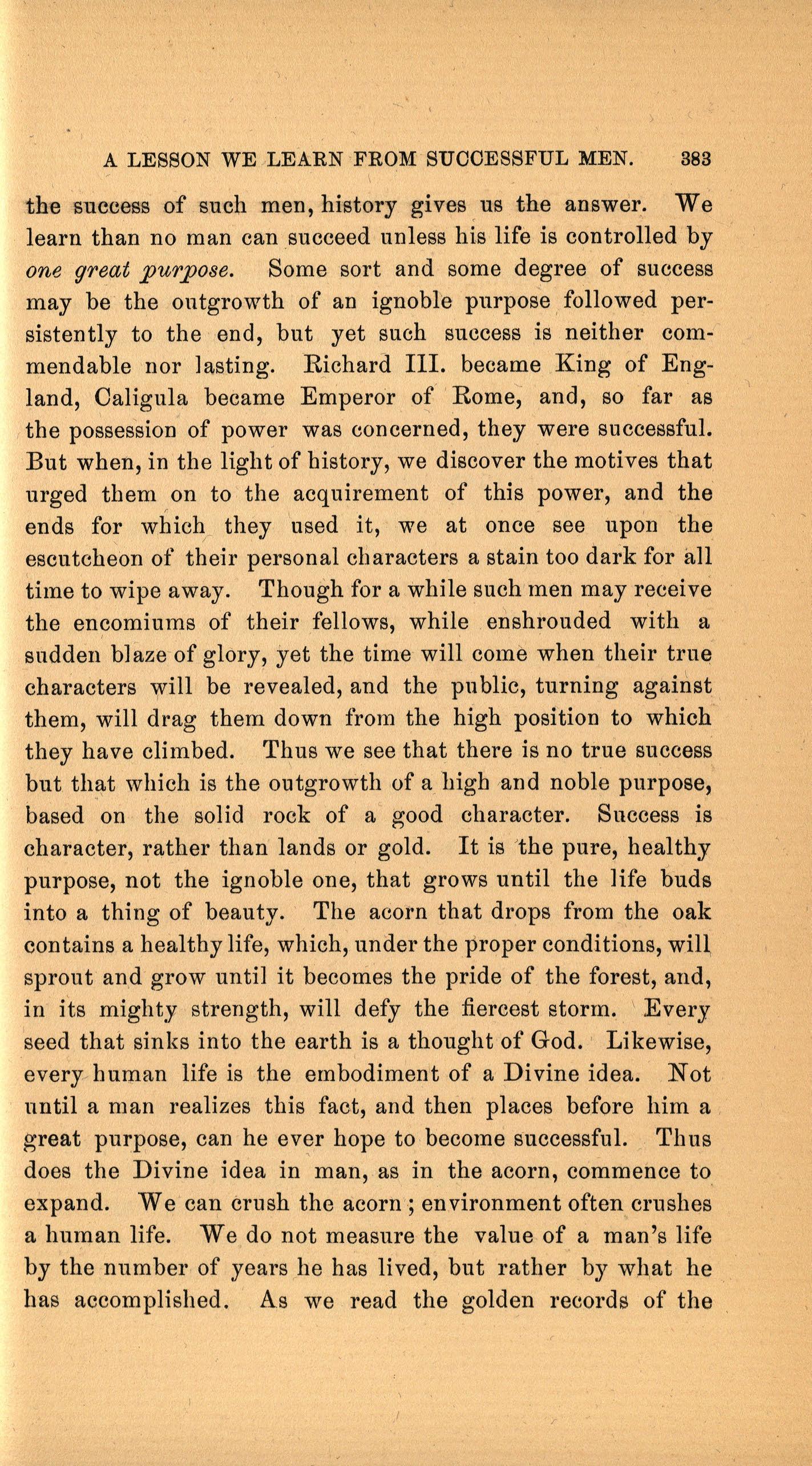
A LESSON WE LEARN FROM SUCCESSFUL MEN. 383
the success of such men, history gives us the answer. We learn than no man can succeed unless his life is controlled by one great purpose. Some sort and some degree of success may be the outgrowth of an ignoble purpose followed persistently to the end, but yet such success is neither commendable nor lasting. Richard III. became King of England, Caligula became Emperor of Rome, and, so far as the possession of power was concerned, they were successful. But when, in the light of history, we discover the motives that urged them on to the acquirement of this power, and the ends for which they used it, we at once see upon the escutcheon of their personal characters a stain too dark for all time to wipe away. Though for a while such men may receive the encomiums of their fellows, while enshrouded with a sudden blaze of glory, yet the time will come when their true characters will be revealed, and the public, turning against them, will drag them down from the high position to which they have climbed. Thus we see that there is no true success but that which is the outgrowth of a high and noble purpose, based on the solid rock of a good character. Success is character, rather than lands or gold. It is the pure, healthy purpose, not the ignoble one, that grows until the life buds into a thing of beauty. The acorn that drops from the oak contains a healthy life, which, under the proper conditions, will sprout and grow until it becomes the pride of the forest, and, in its mighty strength, will defy the fiercest storm. Every seed that sinks into the earth is a thought of God. Likewise, every human life is the embodiment of a Divine idea. Not until a man realizes this fact, and then places before him a great purpose, can he ever hope to become successful. Thus does the Divine idea in man, as in the acorn, commence to _ expand. We can crush the acorn; environment often crushes a human life. We do not measure the value of a man's life by the number of years he has lived, but rather by what he ha s accomplished. As we read the golden records of the

884 ' RICHMOND COLLEGE MESSENGER.
world's great men, we praise them and pronounce them great, because they accomplished something. As - they looked out upon the broad arena of human usefulness and activity, in the early spring-time of youth, their souls were inflamed with a great ambition-one consuming purpose-and they translated purpose into action. As this thought comes to us we are reminded of the words of Martineau:
" Yon sheaves were once but seed; Will ripens into deed."
The most lamentable sight I ever beheld is that ,of a life without a controlling purpose. It jg like a horse without a driver; a ship without a rudder, to be tossed hither and thither by every unfriendly wave that eomes along. There is no excuse for the youth of our country thus setting themselves adrift. There are a thousand honorable avocations, adapted \ to -every kind of taste, each one of which, if faithfully and honestly pursued, will lead to success. Scores of men live, move, depart from the stage of human existence, and are remembered no longer than the insects of yesterday. They have , contributed nothing to the world's advancement, lifted the burden from no shoulder, and thus, nameless and forgotten, have passed away forever. Why? There was absence of purpose. .Like straws on the great tide of human existence, they simply floated on, and that was all. Live for something. Let a man weave his life into the warp and woof of society by contributing to its advancement upward and onward, and his name will be as legible on the hearts of those he leaves behind as the stars on the brow of evening. Whatever the life is, and in whatever sphere, is traceable to the kind of purpose formed in the golden days of youth. ·
But yet a great purpose amounts to nothing unless it is supported by self-reliance. This is one of the strongest elements of character. "Trust thyself," says Emerson;" every heart vibrates to that iron string." In all ages of history

A LESSON WE LEARN FROM SITCCESSFUL MEN. 385 great men have always done so. Realizing the end for which they were designed by their Creator, they trusted i~ those imperial gifts with which God had crown ,ed their beingreason, intelligence, memory, conscience. They felt the Divine hand stirring at their hearts; they saw it pointing them to noble attainments. Undergirded by the ,consciousness of Divine approval, they were bold as lions to proclaim to the world the message implanted in their hearts. No obstacles could hinder them, no foes intimidate. Strong in their convictions, they trusted self, and, with indomitable will, sought to burn into the lives of others around . them the same thoughts that were burning in theirs. May we not here lift the veil, and look in venerati , on upon Luther, Wickliffe, Knox, and Savonarola, as typical examples? Their fame is their best epitaph, and the works that live after them the most eloquent eulogium of those noble qualities of character that have made them so great. Self-reliance is a virtue that grows best in rugged and inhospitable climes. It languishes when Fortune smiles, but g.rows strong when she frowns. The story is told of a German baron, who had two castles on opposite hills, and he determined to make a huge .A!:olian harp of the ravine that stretched between them. He carried the determination into effect by stretching wires across it from hill to hill. He then sat in his castle halls listening for the music, but when the gentle breezes stole over the wires not a sound did he hear. When, however, the winds were released from their caverns, the storm king swept the chords of the harp with mighty hand, and showers of the sweetest music fell on the baron's expectant and delighted ear.
So, when the sky is clear, the winds are favorable, and the little bark in which the adventurous mariner on life's ocean is sailing moves gently onward, nothing remarkable in his life occurs. U nd 'er . sucli conditions a man is in danger of sinking into sloth-yea, even of falling asleep. But when the winds of misfortune, distress, envy, slander, jealousy, hatred,
RICHMOND COLLEGE MESSENGER.
• ' and opposition blow upon him, that "iron string" · of selfreliance rings out so loud that all the world may hear. The mariner leans upon his rudder, and, by the power of his own right arm, guides his bark through tempest and storm. The world is inclined to throw cold water on a sluggard, but when it sees a man who is determined to succeed, and whose wits only grow sharper by the attrition they receive, then the world stands aside and makes room.
But the world often misjudges young men. Many a young man, because he holds up his head and scorns the low and mean, because he is careful about choosing his associates, because he realizes the dignity of his manhood, is branded with the opprobrious e~ithet of "self-conceited." A great many people do not distinguish sharply between self-respect and self-conceit. Only to minds unable to discriminate do these two appear identical. Says Emer son, "Let a man know his worth, and keep things under his feet. Let him not peep or steal, or skulk up and down with the air of a charity boy, a bastard, or an interloper in the world which exists for him." As the self-reliant man looks upon the monuments that the hands of genius have erected that "iron string" vibrates, and he says, "What man can do I can do." Only he learns in history those lessons that may have a practical outcome in life. History is replete with illustrious examples that speak to us in no uncertain voice. These men call us higher, but their voices have no , meaning to the man whose heart does not throb in unison with theirs. Colleges and universities are designed to develop this noble quality of self-reliance. An institution of learning is the world in miniature. It has its fears and hopes, its smooth places and rough, ·its victories and defeats, its joys and disappointments. How bitter is this life sometimes! The college is the architect; we are the rough and unhewn stone. This is only partially true, for character is largely self-made. Within these sacred precincts is encouraged and fostered that

A LESSON WE LEARN FROM SUCCESSFUL MEN. 387 sturdy self -reliance that will do most toward shaping the destinies of the men who go out to fight the great world battles. History, experience, and observation tells us that, to the selfsreliant man, ·all avenues are thrown open. Honor crowns him, applause greets him, and all eyes follow him in his victorious career. The world loves him, because he did not need its love, and caresses him, because he disdained its caresses.
But we learn, still farther, that a great purpose and selfreliance are alike valueless unless they reach their climax in application. Energy is worth a great deal more than brilliancy. .LEsoptaught us this more than a thousand years ago in the fable of th ·e tortoise and the hare. Sustained energy it is that eventually tells. Light your lamp and take a view of the marvelous beauties of Luray Cave, as the darkness flees, affrighted, before your light. See that stalactite, from which drops of crystal water, glittering like diamonds, fall at regular intervals. With the flight of years those drops of water, silently falling, formed underneath that large and bea~1tiful stalagmite, and we wonder how such a little thing can do so much. The explanation lay in the fact that there was long-continued application. It can easily be found out that all history gravitates around a few great names. These men are the embodiment of what we call "genius." But what is genius~ The most satisfactory definition of it seems to be "the ability to do hard work." It is steadfast application. Hogarth, the celebrated painter and engraver, w~en a boy, was thought by his teachers to be hopelessly stupid; but yet, by earnest application, he won a distinguished place in the galaxy of the world's great. He has carved his name so deep on the walls of the temple of fame that the chisel of remorseless time cannot obliterate it. · We are told that Sir Walter Scott wrote the Waverly novels in an incredibly short space of time. Though devoting most of the day to his .friends, he · accomplished this gigantic task, not only establishing his fame

388 RICHMOND COLLEGE MESSENGER.
thereby, but also lifting an irnmen13e debt, that had been a burden to him for many years. True it is, as Longfellow tells us-
" Lives of great meri all remind us
We can make our lives sublime, And, departing, leave behind us Foot-prints on the sands of time.''
Yet, let us not forget that there is only one road to greatness-that of unceasing toil. A great purpose formed is the germ of success, self-reliance is the soil that nourishes it, but application is the dew that moistens the soil and . causes the seed to grow. Let not the gorgeous visions of future greatness, that dazzle the mind in the happy days of youth, so blind our senses as to make us forget that life is real and earnest. Being such, it must be sternly faced. Application is the only alchemy that will convert what it touches into gold.
He Measured It.
They walked alone at ev'ning tide
1 'Neath many a green and shady tree; He talked to her in tones so clear-
" Oh, don't begin again," said she.
" 'Oh, don't begin again,' you say ? "
His voice grew soft, his soul took fire.
" Pray let me tell; you know it well-,,.
" The same old theme; you never tire."
'' 'The sa.me old theme; I never tire ' ? ''
1 Their steps grew slow ; they drooped their heads.
" I love you, girl; my only girl-"
" Oh, hush your foolishness," she said.
" ' Oh, hush my foolishness,' you say ? "
The sun its way did slowly wend.
" Oh, hear my plea; my life for thee-"
" I've learned to like you as a friend."
LINES WRITTEN OF --.
'' You've ' learned to like me as a friend '? '' The night came on with rapid wings. " Oh, for your love, my crown · above-" " Aren't you ashamed to say such things ? "
" Am I ' ashamed to say such things ' ? " , The moon's soft rays through trees did glare. " Pray, say you love." He touched her glove. " Don't squeeze my hand. How do you dare ? "
" Don't squeeze your hand. How do I dare' ?
To only show my love in spans- " "If love's with ease shown by a squeeze, My waist is larger than my hands." ,
Lines Written of --.
Inspiration so lasting, I'll never forget The thri11 that came o'er me the night we first me. A feeling so noble I cannot despise, As entered my soul from those planet-like eyes. I freely admit there was some slight deception, For really I thought I was right near to Neptune, Or the planet of Saturn, or else perhaps Mars, For the light of those eyes outshone all the stars. Much rather would I, if by free choice I might, Dwell aye in a dungeon, with those eyes for light, Than be free as a nightingale under the moon, As ·she lifts her proud soul with an unerring tune. Most freely in deserts I'd spend all my years, Nor hunger nor thirst nor shed bitter tears, Nor grieve at my lot, nor bear a dark mood, If only those eyes might be my soul's food. Oh, Goddess of Love I teach me the rare art, How, by noble means, to win her fair heart; And then may forever those eyes be my own, For that would be heaven, or else there be none.
J. w.c.
389
lEMtor==in==ctbief.
G. THOMAS LUMPKIN. :associate lEMtors.
L . L. J ENNINGS, M u S igm"' R ho
C COTT I NGH AM, M ,e Sigma Rho.
LITERARY.
M. O. S OWE R S, Phil ol og ia ,e
COLLEGIANA . ATHLETICS . GOODWIN F R AZER , Philo logian
L. H. W ALTON, Mu S igm a Rlio EXCHANGES.
W. R. OWEN , Philologia,e. LAW DEPARTMENT. R. H. TALLEY lSusiness .managers.
WILLIAM SMITH, Philologian . G. T . LUMPKIN, Ass't, Mu Sigma Rho .
The editor-in-chief regrets very much that, so A REMINDER. early in his career, he is compelled to assume the a ttitude of the fault-finder . Surely the cont ent s of T HE MESSENGERwill justify him in his complaint s. It m ay be a surprise to some of you to know that we had ab solutely no material from which to select; that every prose article, except one, was used, and that even then it was necessary to use an old essay to fill up the space furni shed us by the business manager. ·
We under stood that the students agreed with the editor-inchi ef that THE MESSENGER should be the organ of the student body, and should represent student thought and student productions.
Upon thi s platform we bega n our labors, and by this principle we propose to stand.
It may be safely affirmed that the average college graduate is more deficient in the art of writing than any other phase
EDITORIAL.
391 of literary work. And yet no part of our education is more important and helpful; no field of labor is more inviting, more honorable, and more promisin g .
We earnestly hope that the students of Richmond College will give more attention to thi s invaluable branch of educati on, and lend a more sub stantial support to onr College maga. zine.
A few more days of hon est toil and the hour
MAKING A of separation will be at b a nd-the hour which CHOICE, terminate s the daily interchange of' courtesy a nd fraternal kindness amon g ourselve s, and withdraws from our walks and places of concour se the forms we have long b een accustomed to greet. Soon we shall hear the solemn stroke of the bell which shall toll for some of us the end of our college life. We shall bid adieu to our companions, our in structors, and our guides, a nd from this quiet haven launch our barks upon the turbulent sea of life.
It is an honr to dash away, as with Lethean wave, every unkind and envious feeling, every hosfile and ungenerous sentiment, which may have insinuated itself into our ·minds; to hallow the friendships which for years have been ripening in our bosoms ; to pledge ourselves, by our respect for our comrade s, by our love for our college, by our regard for the cau se of learning and human improvement, by whatever is painful in the past or hopeful in the future, henceforth to li ve for no grovelling and unworthy end.
A question sufficiently difficult for the far more matured and practical to solve is now forced upon our attention-the question "For what sphere of enterprise and labor is my mind best adapted, and in what occupation may its powers be exerted with the fairest prospects of usefulness and success¥" Much depends upon a wise and satisfactory choice of one's pur suit. An error here committ ed oftentimes proves an error for life, forcing the mind al on g a path to which its
392 · RICHMOND COLLEGE MESSENGER.
talents are unsuited, or subjecting it to the disadvantage of seeking, at a late period, a new field of exertion.
Great importance must be attached to an early choice of some profession and to a speedy entrance upon its labors, when the preparatory culture is completed . Professional life, like the choice garden plants, needs the dew of the morning. It is a matter of much regret when necessity of any kind detains the youthful student a single day from the race that is before him. It is very unfortunate that one should waste on secondary transient pursuits that fervor-that noble, ever buoyant enthusiasm of youth-whi0h gives to all the abiding massive growth of ~ind, the broad expansion, the. deep foliage, and, in the end, the ripe and abundant fruit.
We_have been taught that true and earnest minds, high · in resolve, steadfast in principle, patient, untiring, and hopeful, can alone qualify us to meet the obligations of the age in •which we live. Observation and experience teach that singleness of aim and oneness of purpose, reinforced and sustained by ·an earnest spirit, an indomitable will, and endless effort, are the pre-requisites of a successful career and a useful life. , May it be our concern, then, to mak~ these qualities our own. May we study to adorn the intercourse of life with "what~oever is true and lovely and of good ' report," and,, with the benevolent of the age, strive to diffuse intelligence, personal freedom, good order, and Christianity among the sons of men.
Some of us, perhaps, may go out with the kindred feeling ' of a pilgrim of old, "not knowing whither he went"; but if we shall put into requisition all that is manful and heroic in pu,rpose, and trusting in a Power which will enable us to overcome the greatest difficulties, and change even untoward events into elements of ultimate success, we shall find that victory will crown our efforts, and that we sf1all not be · unworthy sons and daughters of the old Alma Mater which nurtured us and sent us forth. ;
EDITORIAL.
393
The Mu Sigma Rho Society, a few meetBOOK REVIEWS. ings ago, unanimously decided to enlarge its literary program by having an original book review read by one member of' the Society each week, and that this review should be submitted to the editor-in-chief of' THirMESSENGER,to be published , at his discretion. We wish herewith to express our hearty approval of this proposition, and to say that the editor-in-chief will be delighted to receive and publish any criticism of merit presented to him.
We can think of no phase of literary work which is more inviting and helpful, which displays finer literary taste and exhibits greater literary culture. It not only shows one's love for literature, but also makes manifest one's power to discover the excellencie~ or defects of a production, and thus enables him to treasure up the good and discard the bad.
We hope that not only the Mu Sigma Rho Society, but also the Philologian Society and every student of the institution, will encourage and help on this phase of literary work, that each succeeding issue of THE MESSENGERmay present a number of excellent book reviews of which it may not be ashamed.
The Tenth International Convention of THE Il, Y, P, U, CON• the B. Y. P. U. of America will be VENI'ION OF 1900, held in Cincinnati, Ohio; on July 12-15, 1900. The railroads are very generously giving a round-trip ticket at the rate of one fare from all points east of the Missouri river.
The location of Cincinnati makes it the gateway of the South and the keystone between the East and the West. It is one of t he most picturesque cities in the United States. The Baptists of the city extend a most cordial invitation to this meeting, and a most enjoyable trip is guaranteed. It will be a great treat to those who may be able to attend . . And it might be the occasion of another " B. Y. P. U. Romance.''

The Philologians, having completed their hall, held their openrng exercises Friday evening, May 4th. They had a very nicely-arranged programme, and every one seemed to spend a very pleasant evening. They were highly honored in having seve ral recitations, delivered by Miss Bell and Miss Sullivan. All were delighted with the music furnished by Messrs. Day Lee and McConnell. The audience was very highly entertained by the readers of the evening, Messrs. Sowers and Hurt. Dr. Ryland, one of the founders of the Society, spoke about its early history. Then we listened with very great interest to the addresses of some of our professors. Some of our old members were called upon _ to speak, "and with · one accord began to make excuses." After the .literary part of the programme for the evening was completed, refreshments were served, and every one seemed to enjoy the social hour of the evening very much. The hall is very beautifol, and we hope that it will inspire many men to flights of oratory next session.
Wanted! Wanted!! Wanted!!!
Mr. A. T. King wants the public to know that he will run a side-show on Broad street dnring vacation. He wishe s to give exhibitions in camel-riding. Mr. King made his debut in beast-riding during the Carnival. The grace and ea se with which he rode the spirited camel was a wonder, and a joy to the multitudes who witnessed the feat.
Mr. Smith conducted our Wednesday evening prayermeeting on the 9th of May. He spoke on the great importance of sending some representatives to the summer school at Asheville, N. 0. Professor Pollard also gave us a very helpful talk. We want to send foni· delegates to the
Conference, if po ss ible, and, in order to 'do it, we ask every s tudent to help ns.
Messrs. Hart, Holland, and Armistead are very much interested in winning "Marks." Those who have been observing the contest think that Mr. Armistead is ahead, and we have been told that he frequently exclaims in his slumbers," My Marks! my Marks! ! my Marks!! ! "
The "Improvement Debate" of the Mu Sigma Rho Literary Society was held on the night of Friday, May 11th. A1l the speeches were of a high order. After a number of ballots, Mr. L. M. Ritter was decided to be the winner.
On the same night the Philologian Society held its best debater's contest. This contest was decided by judges. Mr. Cammack won. ·
The nights recently have been excessively warm-so warm, in fact, that the boys found it necessary to move all the furniture of a certain "rat" out on the campus, so that he might be able to sleep.
We considered it quite a treat to have Rev. J. L. Gross, of Georgia, to conduct our morning service some time ago. He rbade a short talk, which was enjoyed by all. We are always glad to welcome visitors.
We were very glad to see Dr. McConnell on the campus several days ago. We were very sorry that he could not be with us longer. We wished so much to have him conduct our chapel service for us.
The College buildings are being beautified by fresh paint, · and the boys have taken advantage of their opportunity, and "painted everything red," even the black-boards.
Mr. Buxton made a flying visit home last Sunday, and, judging from his conversation, it seems that he spent a very pleasant day with some one.
Several of our boys have become such potent factors in our Oo1lege life that they have their grades sent to the President's office daily.
The ball season is about over for the BASE-BA.LL. "Spiders" of 1900. Taking a retrospective view, we can see the weak as well as the strong points in the team, and, while we mourn some defeats, we rejoice in some victories. ·If the majority of the men on the team return next year (and it is probable that they will) we should have a strong team for 1901.
On April 6th the "Spiders" crossed bats with Gallaudet College, at Washington, D. 0. This team proved a strong one, and defeated Richmond with the score of 15 to 2.
The next day, April 7th, Richmond played with the Episcopal High School, defeating them with a score of 18 to 6.
The two games played with Lehigh University were both lost.
On their last trip the weather was so bad that the team was able to play bnt one team-this was Washington and Lee, on the 20th of April, at Lexington. On account of rain this game was called in the seventh inning, with the score 6 to 2 in favor of Richmond. \ April 24th Richmond met and defeated William and Mary College in a well-contested game. The score was 12 to 7.
The morning of Friday, May 11th, dawned }'IELD DAY, bright and cle~r, with a fresh breeze blowing, giving promise of a beautiful day, which was fully realized . . The pleasant weather, the large and enthusiastic crowd, and the well-contested events made the Field Day of 1900 one long to be remembered, and reflected credit on the committee who so ably arranged the details . The following is the program and winners:
-~ennis, Singles-First prize, a gold medal, won by J. Day Lee; second prize, a tennis racquet, won by Percy Pemberton. Tennis, Doubles-Prize, two dozen photos. Won by J. Day Lee and H. M. Taylor.
ThrEJe-Legged Race-Prize, two copies of "The Spider." Won by J. W. Cammack an ,d R. Staples. Time, 13 2-5 seconds.
Throwing Base-Ball-Prize, fountain pen. Roy D. White, 109 yards; F. Kerfoot, 98 yards.
Standing Broad Jump-:-Prize, rocking chair. Won by F. W. Norfleet, 9 feet 8 inches; second, T. Carney, 9 feet 6 inches.
One Hundred Yards Dash-First prize, gold medal; second prize, fountain pen. RoyD. White, first; F. Kerfoot, second; A. T. Woodward, third. Time, 11 seconds.
Half-Mile Run-Prize, rocking chair. Roy D. White, first; M. Frazer, second. Time, 2 minutes 26 2-5 seconds.
Hump -Back Race-Prize, two subscriptions to THE MESSENGER. Won by M. Frazer and S. McConnell.
High Jump-Prize, golf trouse_rs. Won by T. Carney, 4 feet 11 inches; afterwards jumped, 5 feet 1 inch.
High Kick-Prize, box of cigars. Won by F. Kerfoot and T. Carney, each kicking 8 feet 2 inches.
Hurdle Race-Prize, sweater. Won by F. Kerfoot. Time, 18 2-5 seconds.
Running Broad Jump-First prize, sweater; second prize, gold scarf-pin. Roy D. White, 19 feet 6½ inches; E. Sheon, 18 feet 8½ inches; F. Kerfoot, 18 feet 8 inches. White's jump broke the College record.
Apple-Eating Contest-Prize, fountain pen. Won by J. Drake. ·
Basket-Ball (Olympians vs. Invincibles)-Prize, one gallon of ice-cream. Won by Olympians.
Quarter-Mile Run-Prize, visiting cards and plate. Roy D. White, first; M. Frazer, second. Time, 1 minute 7 seconds.
Obstacle Race-Prize, pair of shoes. F. Kerfoot, first E. Sheon, second.
398 RICHMOND COLLEGE MESSENG:ER.
Po]e Vault-First prize, smoking jacket; second prize, cuff buttons. S. McConne11, 8 feet 4 inches; Roy D. While, second ; M. Frazer, third.
Putting Shot-Prize, umbrella. Roy D. White, 27 feet 8! inches; P. Massie, second. ·
Mile Run-First prize, gold medal; second prize, pair of shoes. A. T. Woodward, first; M. Frazer, se-cond. Time, 5 minute s 52 1-5 seconds.
Consolation Race-Prize, ice-cream. Won by J. Drake. All-around medal won by Roy D. White.
~,The Cornish Smuggler," in the Student of Wake Forest, is a nice little story, and neatly told, but we really think the author should have given more of a detailed narrative that would have necessitated a pretty unfolding of his plot ; but, as it is, he states point after point of his story, and leave s the reader with the feeling that he has read the synopsis of a good story.
The element of poetry in our college magazines clearly is unimportant, as shown by the average exchange that comes to us. Poetry is certainly a higher type of literary matter than prose. We fear that many of the prose articles that we see are perhaps essays revised, and in some cases padded ; but when we strike the poems we feel impre ssed th a t the author has spent at least some little labor, for his work has been truly a creation .
The Gray Jacket, of Blacksburg, is certainly creditabl~ . We like its cover. It is neat, and has a caste of the artistic about it. It is . an unusually well-arranged book. The literary department embraces poems, essays, biographies, and fiction. Its departments of local, exchange, athletic, personals, Y. M. C. A., &c., are well regulated, and supplied with the best of matter.
The Hampden-Sidney Magazine is not lacking in storiettes, but we feel th.at we should double the ette. However good the .stories may be, they soon lo se their sa vor, becau se they don't last long enough
The following is good t.o copy :
400 RICHMOND COLLEGE MESSENGER.
Oh, if I only kn.ew Greek, A " cinch" would lessons be; For English, Latin, French, and DutchThey all seem Greek to me. - Ex.
Breathes there a man with soul so dead, Who never to himself has said, As he stubbed his toe against the bed, -? -?I I I -? -Ex.
" Backward, turn backward, oh, Time, in thy flight; Feed me on growley again, just for to-night. I am so weary of sole-leather steak, Petrified doughnuts, and vulcanized cake; Oysters that slept in the watery bath, Butter as strong as Goliath of Gath; Weary of paying for what I don't eat, Chewing up rubber and calling it meat. Backward, turn backward, for weary I am; Give me a whack at grandmother's jam; Let me drink milk that has never been skimmed, Let me eat butter whose hair has been trimm ed. Let me once more have an old-fashioned pie, And then I'll be ready to turn up and die. "-Ex.
WITHERED ROSES.
When Love was young he plucked a roseA dewy, dainty flower.
Stung by thorns, away he throws The pearly blossom. Ere an hour He would drink its odor sweetLifts it from beneath his feet.
" Pretty bud I" he fondly cries; "Raise your dainty heaq."
Low the little rose replies, "Nay, I droop, and soon am dead." Little Love too late discloses Thorns hurt less than withered roses.




